Looking






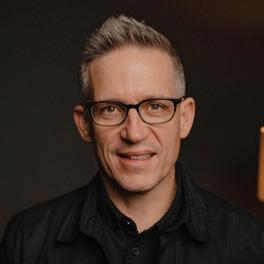







Will
EWS


the Vision Before Us
Does This State
Work,
















Will


the Vision Before Us
Does This State
Work,

The sincere question came after I quietly informed a family member the widely circulated rumor he shared had proven false (and cautioned him about the source).

It was not the first time I had heard the question, nor is it an easy one to answer. In a day when technology has made “news” more available than any other time in human history, news also has grown increasingly suspect. Unre liable information has become such a problem in recent years that “fake news” has become a pop culture catch phrase. From politicians and pundits to TV personalities, accusations are hurled back and forth about who is really telling the truth. An election year doesn’t help matters, as candidates offer endless questionable claims about themselves and those running against them.
Bad News name (and God’s) on the line—verify the facts. A few extra moments of research could save your reputation... and His.
The rise of fake news makes it difficult to point to any three- or four-letter network, radio program, website, magazine, or newspaper and recommend it without a lita ny of disclaimers. Sadly, even some Christian news sourc es have been called on the carpet for poor journalistic standards, questionable or misleading statistics, double standards, and—in worst cases—outright misinformation.
While crumbling journalistic integrity is troubling for soci ety-at-large, it is especially troubling for Christians, those called to lives of honesty and integrity (Colossians 3:9; 2 Timothy 2:15; Ephesians 4:25). Proverbs 6:16-19 leaves no room for doubt when “a lying tongue” and “a false wit ness” are listed among seven sins God hates. Not telling (or sharing or posting or repeating) falsehoods must be a high priority for believers.
That brings us back to the question: “Where can we find some reliable news.” Bluntly, it takes serious work to sift today’s news for the truth. Start with the following simple checklist:
Verify. Confirm the facts. Check the sources. Carefully examine statistics. Scripture tells us to prove or test ev erything and “hold fast” to what is good (1 Thessalonians 5:21). Before sharing, posting, or printing—putting your
Consult multiple sources. Don’t rely on a single news outlet (especially social media). Consult sources represent ing a spectrum of perspectives, even those uncomfortable to you. Define historical views and perspectives. Call an expert in the field. In short, do your homework. Research ing widely will help you gain a broader and more accurate understanding of world events.
Dodge conspiracy theories. Sure, many conspiracy theories are built upon a kernel of truth. However, without facts and documentation, they are little more than unver ified gossip. When shared as truth and later proven false, the resulting damage to integrity can have disastrous effects.
Speak the truth in love. When you arrive at the truth, use it redemptively. Truth is not a weapon to brandish against a broken world but a roadmap to lead the broken to the Source of all truth. Present truth carefully, in love, and with eternity in mind.
About the Columnist: Eric K. Thomsen is managing editor of ONE Magazine. Email: eric@nafwb.org.
“I don’t want to share bad facts, so where can I find some reliable news?”
Reverend Johnnie Floyd, Jr. passed from this life April 15, 2022, at age 93.
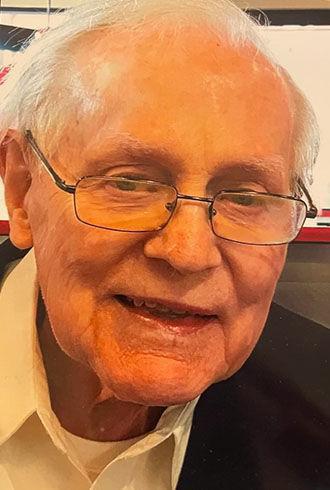
Born April 29, 1928, in Mt. Holly, North Carolina, he graduated with honors in 1954 from Free Will Baptist Bible College (Welch College) and served as a Free Will Baptist pastor for 45 years in Virginia, Michigan, North Carolina, and Tennessee.
Floyd served as the assistant secretary of the National Association for two years and on the General Board of the National Association
for two years, representing the state of Michigan. He taught at Piedmont Bible Institute (Cramerton, North Carolina) for ten years, and was active in missionary work in Jamaica.
Reverend Floyd and his widow Ruth (Long) married in 1947 and served the Lord together faithfully for 74 years, sharing an incredible Christian example with everyone around them.
Share photos and memories: ledfordfuneralhomes.com
EDITOR-IN-CHIEF: Eddie Moody MANAGING EDITOR: Eric Thomsen
ASSOCIATE EDITORS: Ken Akers, Adra Brown, David Brown, Kathy Brown, Jeff Caudill, Danny Conn, Claiborne Scott, Deborah St. Lawrence, Phyllis York LAYOUT & DESIGN: Randall House Publications DESIGN MANAGER: Andrea Young DESIGN: Marianne Stewart PRINTING: Randall House Publications
While ONE Magazine is provided to the reader free of charge, tax-deductible donations are both accepted and appreciated.
To make a donation, simply send check or money order to ONE Magazine, PO Box 5002, Antioch, TN 37011-5002.
PHOTO CREDIT: Eric Thomsen, Shutterstock.com, Istockphoto.com, Stockxpert.com, Designpics.com, Rodney Yerby.
Since 2006, Master’s Men has guided Free Will Baptist disaster response, helping the denomination work together to provide relief on a much larger scale. Coordinating with state teams and local volunteers, Master’s Men prepares for disasters before they happen. You can help the DRT in a number of ways:
Become a DRT volunteer. Provide financial assistance. Donate equipment and supplies. Pray. Learn more about the DRT: FWBMastersMen.org


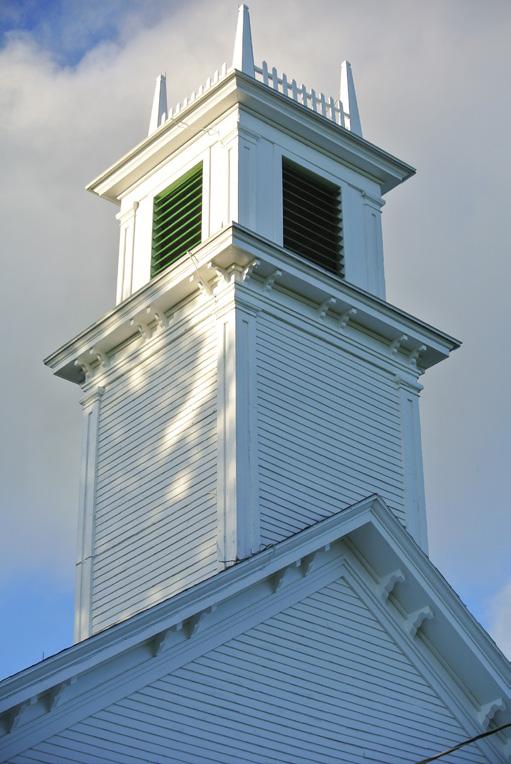

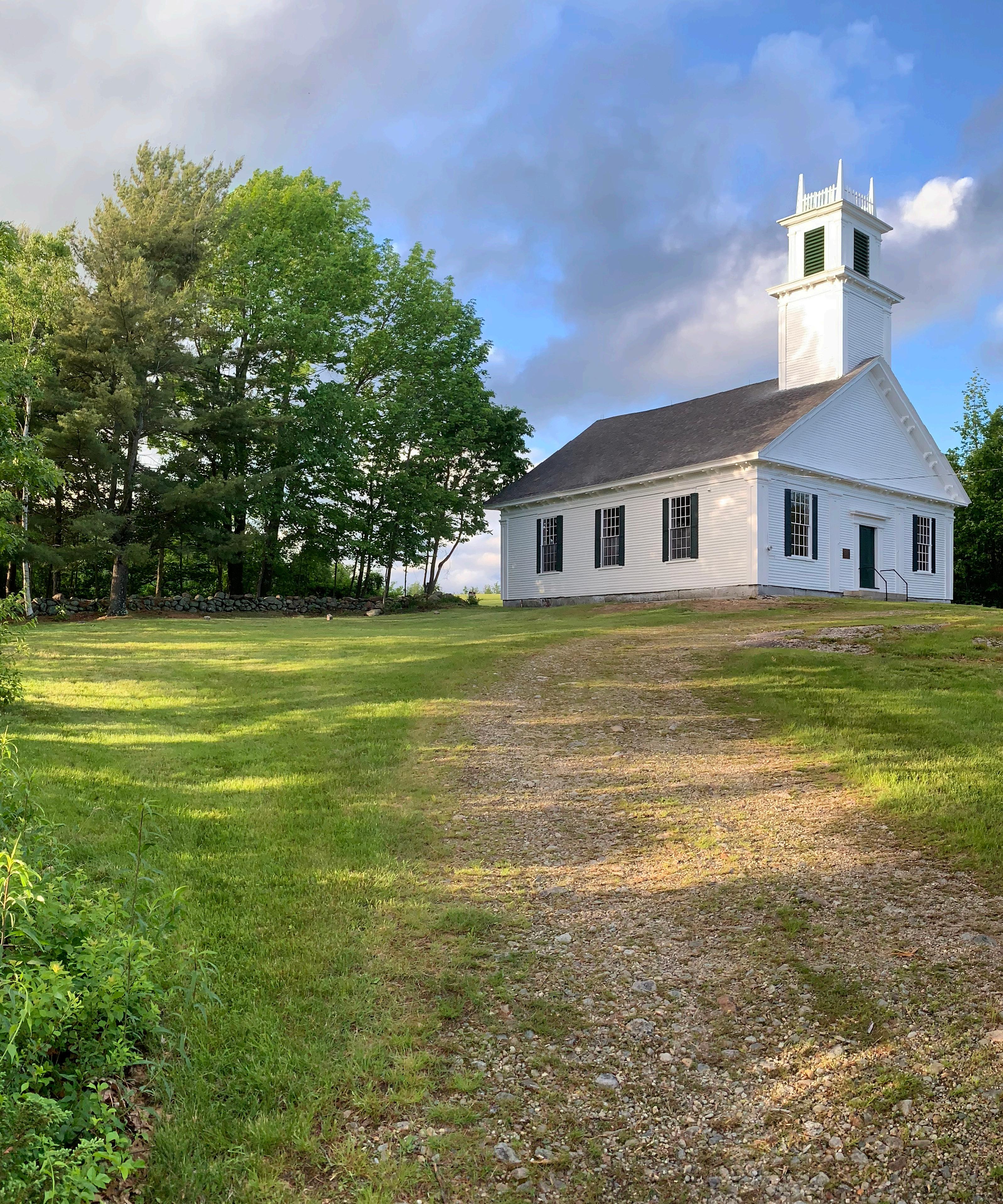

after worship services were first held in the Ridge Church in New Durham, New Hampshire, 65 Free Will Baptists from across the nation gathered at the historic building to celebrate two centuries of God’s faithfulness. Originally planned for 2019, the celebration was delayed, first by construction, then by COVID.
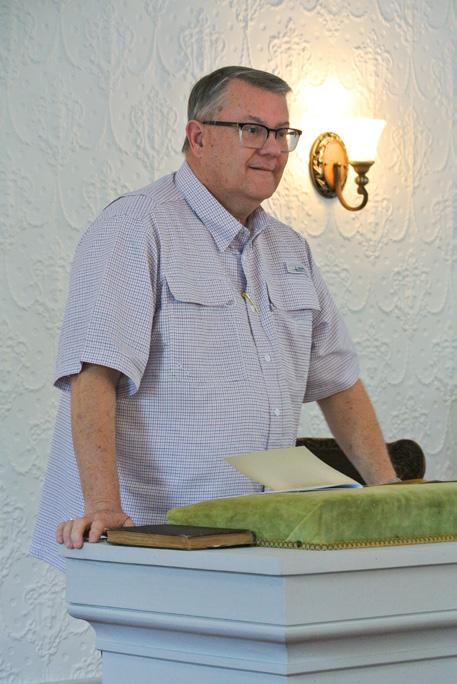

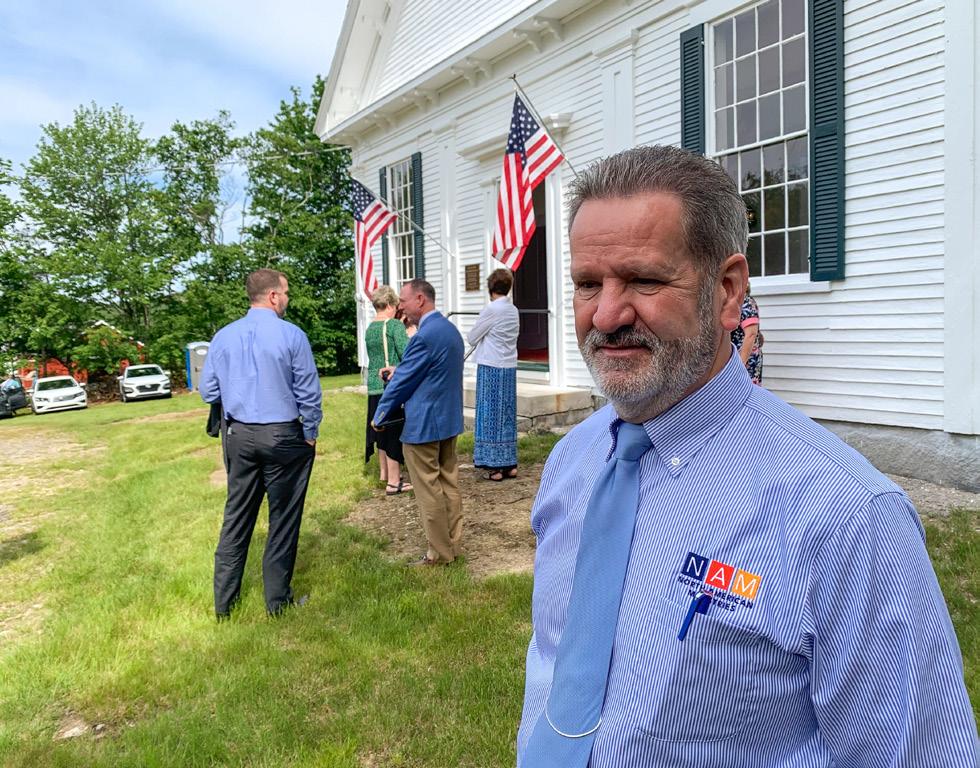
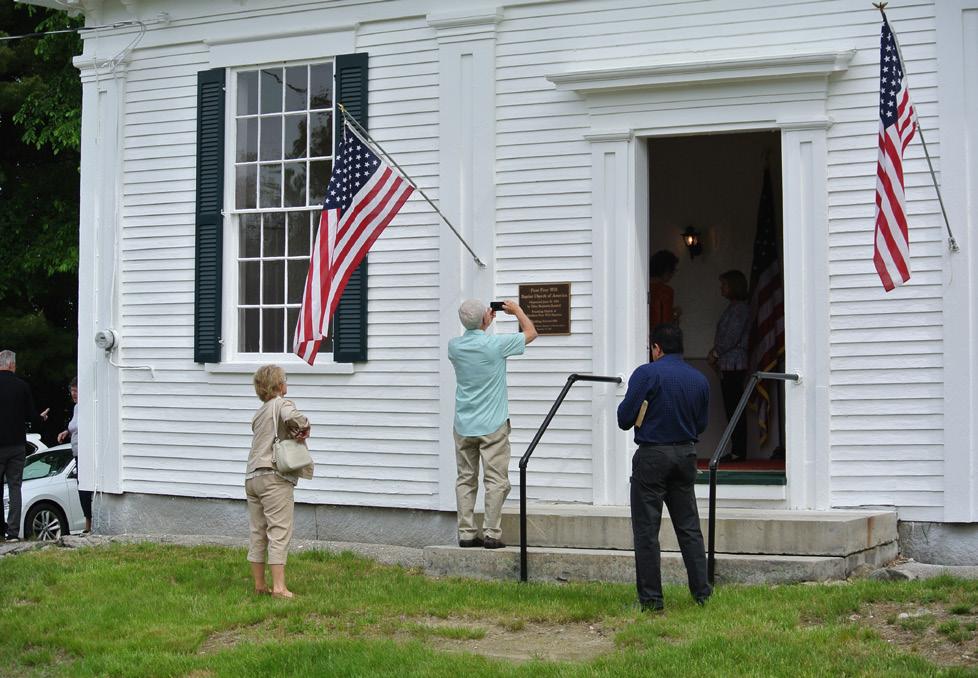

As singing filled the old sanctuary, attendees were trans ported back two centuries. Cool New England breezes drifted through open windows. Brilliant sunshine lit the room, and the lowing of cattle and cackle of chickens echoed in the distance. “You could close your eyes and imagine being in one of those early services,” an attendee observed. “It almost felt like going back in time.”
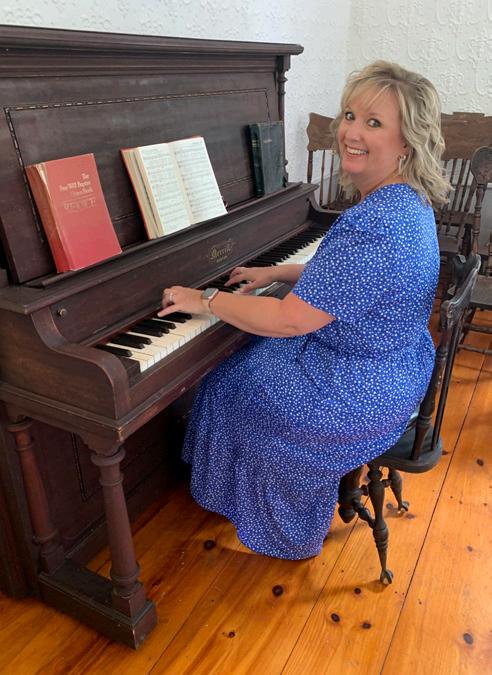
The Ridge Church was founded June 30, 1780, in the east room of Zechariah Boodey’s home when seven men and women signed the church covenant and 13 articles of faith penned by Elder Benjamin Randall. The congrega tion included Randall, Robert Boodey, Nathaniel Buzzell, Joseph Boodey, Judith Chartel, Margery Boodey, and Mary Buzzell, as recorded in the New Durham Church Record Book.
Growth soon made it necessary for the group to move from the Boodey home into the New Durham Meet ing House, where it continued to gather for nearly four decades. However, in September 1818 (a decade after Randall’s death), plans were finalized for a building to be constructed on New Durham Ridge. Pews were “sold” to families in the church to raise funds, and workers started building a month later, earning four shillings (50¢) a day.
The work was completed the following summer in 1819. Two centuries later, the original building remains stand ing and recently became the property of North American Ministries.
Over the two-day celebration, four speakers looked back over the remarkable life of the church. Ohio historian Mark McCarty explored the founders, pastors, and con struction. Master’s Men Director Kenneth Akers described significant renovations completed in the last two decades. David Crowe, director of North American Ministries, shared an overview of Free Will Baptist history, in which the Ridge Church played a pivotal role. And when attend ees visited Benjamin Randall’s gravesite, located a halfmile from the church, Historical Commission member
Eric Thomsen identified significant moments in the early life of Benjamin Randall that led him to start the New Durham congregation.
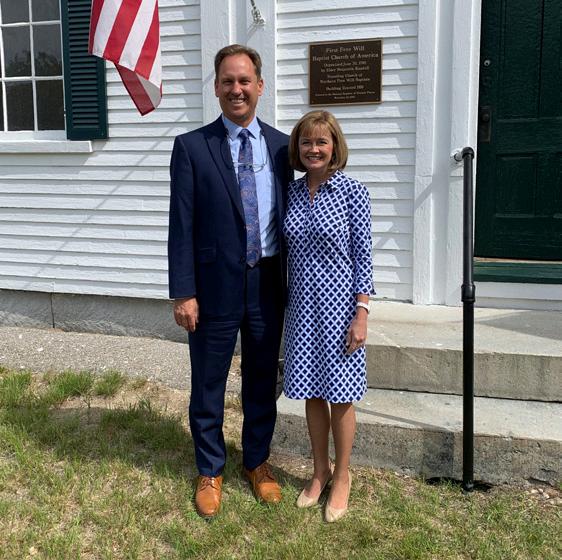
Following each service, cookout-styled meals were held at the First FWB Church in New Durham. Saturday evening, the group gathered for a fellowship meal at The Castle on Charles, a historical church building converted to meeting space.
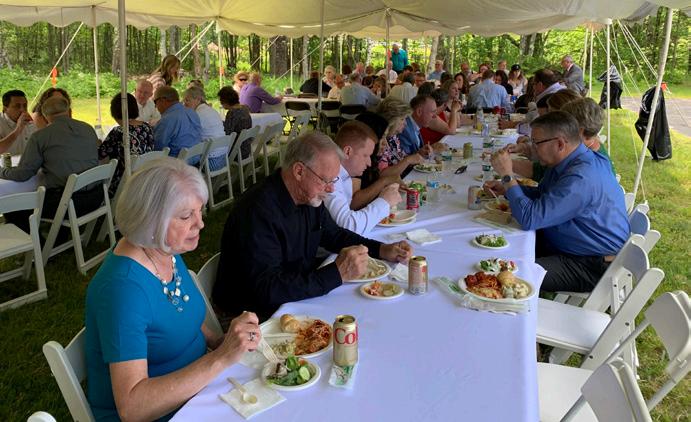
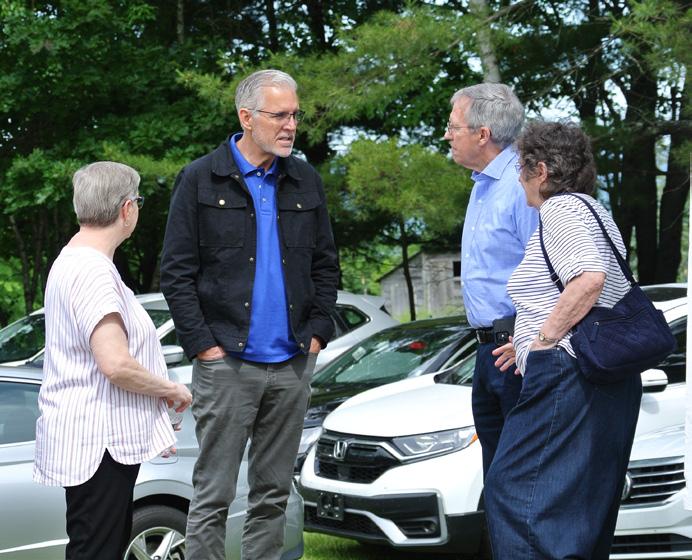
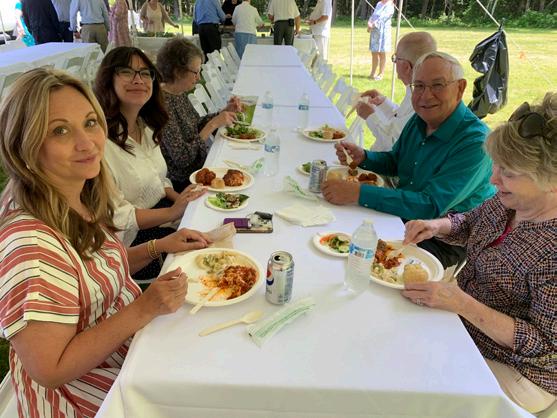

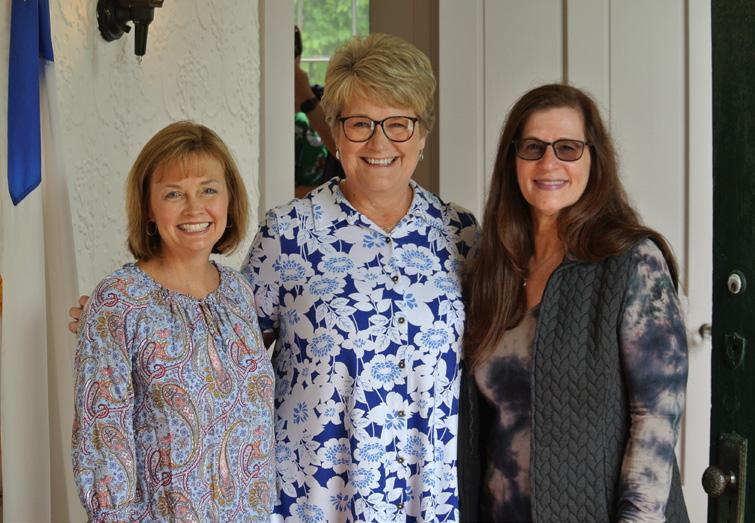

Many visitors immersed themselves in Free Will Baptist history during their visit, traveling to nearby historical sites: Parsonsfield Seminary; Ocean Park, Maine (where Free Will Baptists constructed a retreat center for meet ings, conferences, and camps); the New Durham Meeting House; Bates College, founded by Free Will Baptists and still operating today; and numerous historic churches and cemeteries. They browsed historic documents archived at the First Church in New Durham, took pictures in front of the Ridge Church, behind the pulpit, and at the piano.
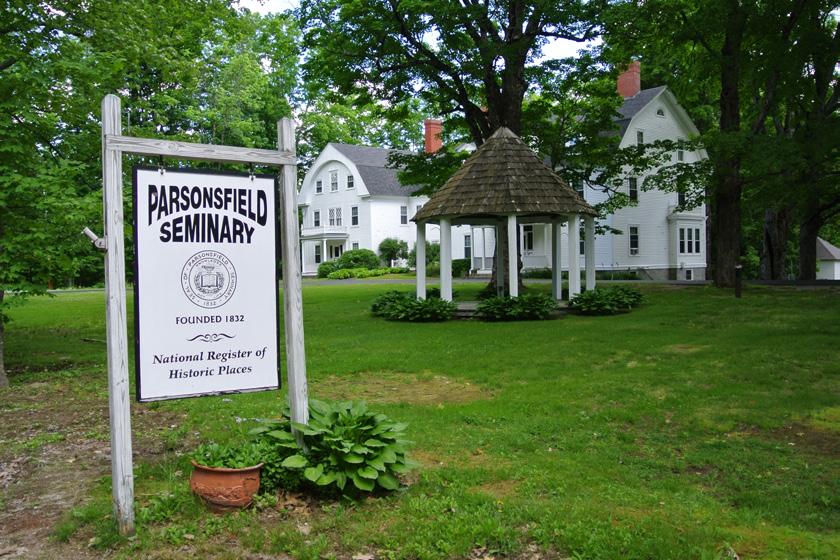
On Sunday morning, David Crowe preached from Psalm 72, recalling the text used throughout the centennial celebration of northern Free Will Baptists in 1880, when 1,500 people came together to mark the occasion. He challenged listeners to be faithful as the “handful of corn” God would use to reap great harvests in future genera tions. With the service and celebration drawing to a close, the altar filled with Free Will Baptist leaders earnestly begging God to keep Free Will Baptists faithful to His Word and gospel.
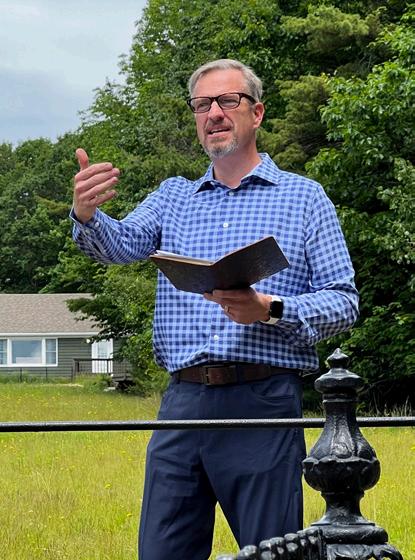
“Learning more about the sacrifice and legacy of Benja min Randall and his ministry has been fascinating and convicting all at the same time,” wrote Jennifer Miller. “What they did in that first 100 years is remarkable. No church body is too small for God to use. We laughed in the old church building, we cried, we sang, we prayed, and we worshiped!”


Over the past decade, Master’s Men has worked hard to restore the Ridge Church. Many major projects have been completed: foundation and bell tower repaired, roof repaired and replaced, sagging chimneys removed, paint, shutters. This summer, as we celebrate more than two centuries at the Ridge Church, the landmark structure is sound. All that remains of the renovation are details, a few things that are still a little “ragged around the edges.”
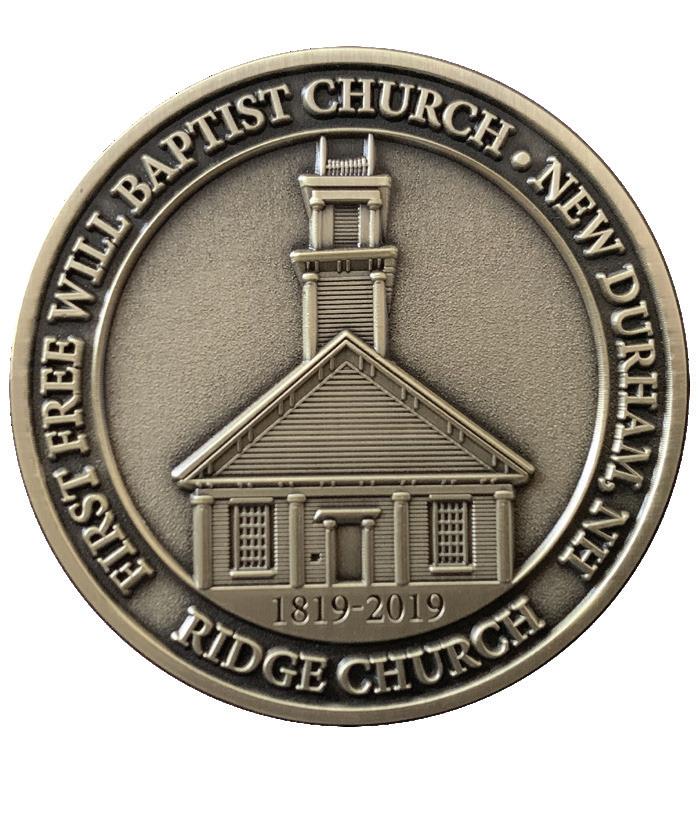
Master’s Men Director Ken Akers has a list of smaller projects remaining at the Ridge Church. Would you or your church adopt one (or more) of
following and help
donations to volunteers,
 BY CH MARK MCCRANEY
BY CH MARK MCCRANEY
Days begin best for me with a good cup of Joe, but good coffee doesn’t just happen. It is the result of the precise amount of freshly roasted beans, hand ground to the proper fineness, combined with the correct amount of water to achieve a proper water-to-coffee ratio, and then mixed for an adequate retention time. All told, it typically takes me about 20 minutes to make a proper batch of coffee each morning.
I am sometimes asked why I go to all the trouble to make coffee the way I do. In an age of K-cups, programmable coffee pots, and instant coffee, why take the extra time each day just to make some Joe? One answer is that coffee really is better that way. The slow, deliberate method ex tracts more of coffee’s natural flavors and undertones, and results in a superior tasting cup. In fact, it is good enough that you really don’t need to add anything to flavor it!
But I have another, more personal reason I go through the process every day. For me, it is a daily reminder to slow down. It helps me remember that each day I must inten tionally set aside the urgent and concentrate on the most important thing in my life—my relationship with God.
Many of us live each day oppressed by the tyranny of the urgent, madly scrambling from task to task until we col lapse exhausted into our beds with a list of still unfinished things hanging over our heads. We’re like a circus juggler on a high wire, frantically trying to keep five balls orbiting above his head while seated precariously on a unicycle. Because we allow ourselves to be so busy with the urgent, we leave no time for the most important. We allow the good to crowd the best in our lives, and this busyness is the enemy of our souls.
As a military chaplain, constantly ministering to the spiritual needs of those around me, I have learned how important it is to slow down. For me to do my job well and to care for others, I must maintain good spiritual
health and resiliency. The answer to doing that is found in slowing down deliberately and carving out times for stillness. In Psalm 46:10a, David was told, “Be still, and know that I am God.” At first, it seems like a simple, straight-forward message, but I have learned it is not easy to implement in my life. Perhaps you share that experi ence. We live in a world in perpetual motion. We all have more to do than we ever get done. If we are completely honest, we may only feel valuable or important when we are moving and doing.
Stillness allows time to care for our souls. It is not inactivity but refined activity with the clear purpose of renewing our souls by finding peace. Being still is choos ing to “do nothing,” a purposeful disengagement from all the “busyness” of life. By pausing the chaos for just a few minutes each day to seek stillness, you will find you can be more mindful of the presence of God and more open to His leading.
I have learned I must plan the still time in my day. It must be designated, and I must give it highest priority. For me, it must be early, before my mind is cluttered and my concentration divided. It’s helpful to have a certain place
I designate as my “still” place—one spot reserved for my time with God.
I encourage you to take Psalm 46:10 seriously. Don’t let the world mold you into its rat race of constant motion. Create quiet space in your life. Learn to be still. If you don’t, you’ll never really be able to learn to know God. Like the great cup of coffee I described earlier, the slow, deliberate method of being still each day extracts more of life’s natural flavors and undertones, and gives you a better start to every day.
About the Author: Chaplain Mark McCraney serves in the United States Navy and is currently stationed at Camp Lejeune, North Carolina.
I like coffee. It might be more accurate to say I love good coffee. In fact, my very strong opinions regarding coffee and the way it should be made and consumed have led my family to call me a coffee snob.
 BY RON HUNTER JR.
BY RON HUNTER JR.
I heard about the butterfly effect for years, but it took time to wrap my mind around it. We all scratched our heads the first time we heard how a butterfly could flap its wings in Brazil and cause a hurricane in Texas. The concept illustrates how small things cause an unpredictable snowball with positive or negative outcomes. Ben Franklin shared the following poem illustrating the butterfly effect:
For want of a nail, the [horse]shoe was lost, For want of a shoe, the horse was lost, For want of a horse, the rider was lost, For want of a rider, the battle was lost, For want of a battle, the kingdom was lost, And all for the want of a horseshoe nail. Obviously, the flapping of a butterfly’s wings is metaphorical. Still, history confirms the idea that one tiny act can trigger unpredictable results. Examples include the assassination of Archduke Ferdinand, which plunged the nations into World War I. A German art college rejected a young man’s student applica tion resulting in would-be artist Adolf Hitler orchestrating the Holocaust.
While often overlooked, not all tiny acts produce dire consequences. One such act: a mother asked her teenage son George Washington to accompany his brother to Barbados, where they contracted smallpox. Later, General Washington lost thousands of troops to the contagious disease. Because of Washington’s natural immunity, he avoided the disease, went on to win the Revolutionary War, and became America’s first president. Similarly, in 1924, a fire ravaged a Danish carpentry shop that built wooden block toys. The flap of that fiery butterfly’s wings sent ripples that allowed the owner, Ole Kirk, to rebuild his shop, using plastic to create what we know today as Legos.
What others view as tiny acts made a big difference in my own life. Elderly Mr. Kennedy, the gum man, sat on the front pew of our church, passing out Juicy Fruit to all the boys and girls coming out of Sunday School. Robert and Brenda Nicholson, who taught my junior-age Sunday School class, made the Bible come to life. As a Sunday School teen, I sat under Lauren Owen, who offered small rewards for memo rizing Scripture—passages I still recall. Would I be here without those little acts? Or without my pastor, who nurtured my call to preach? Think of all the tiny acts, good and bad, which shaped your life.
Randall House & D6 Family Ministry often hear about tiny moments with far-reaching effects. From a take-home paper sparking a conversation in the car to watching kids spend ten minutes in their devotional magazines and learn to deal better with peer pressure. We love hearing the stories from the classroom to the dining room, where tiny moments flapped their wings to reveal God at work.
Pastors who preach D6 Curriculum themes and empha size at-home connections see families enjoying talks about lessons or sermons away from church.
As COVID-19 flapped its wings, the resulting storm pushed our pastors to adapt and advance in technological areas faster than we would have without the pandemic. Not gathering at church for months revealed families’ spir itual strengths or weaknesses. We see a renewed effort in Sunday School, small groups, and most of all, equipping parents with tools for generational discipleship at home.
The past 33 months inform us as we prepare for the next big release of the D6 Curriculum in fall 2023. We formed a Discipleship Task Force in 2021 from across our denomination. The members function as a large focus group and will also provide trainers, writers, and exam ples for other churches. Without a doubt, the results of their contributions will be determined a generation or two from now. We challenge you to set up a discipleship task force in your church, a group of people who send tools home to help authentic heart conversations occur. Your task force could emphasize a family-aligned set of studies, family-aligned devotionals, and activities focused on all generations and build a biblical worldview.
We love seeing the flap of wings in church on Sunday impact the home on Thursday—or any other day—by empowering parents from the same themed lesson everyone shared. However, the flap in Brazil creating Texas hurri cane moments seems more believable lately for Randall House & D6 Family Ministry. Eighteen years ago, the first D6-style curriculum landed in Free Will Baptist churches and homes around the United States. That event triggered multiple outcomes, including more conversations before heading off to school, on car rides, around the dinner table, and just before bed. In addition to D6 moments in the home, the flutter across the ocean occurred as D6 disciple ship reached numerous Asian countries.
Our role is not to send missionaries but to provide global discipleship support to missionaries, pastors, and fami lies. From that first age-aligned fall curriculum quarter in 2004, we now reach many nations with the message of D6. A generation grew up using D6 and now uses the devotional magazines with their own kids. We went from a North American-centric ministry to global growth.
In June, I visited churches in South Korea using D6 Cur riculum and doing it right, both at church and at home. I sat down with 15 pastors who shared how kids are finding excitement in being at church and doing their daily Bible reading at home. These pastors in Asia understand authen tic generational discipleship creates daily disciples. The power of the gospel at church should affect the home.
The Randall House book division posted its best year in 2021. We saw the most Randall House & D6 imprinted books sold than in any previous year. This trend continued as the first quarter of 2022 proved to be the best ever. At writing, Randall House has licensed more books for trans lation in the last seven years than our entire history. We licensed 32 of our titles to be translated into 18 languages, which resulted in 68 translations. Visionary Marriage, Vi sionary Parenting, and The DNA of D6 comprise the three most translated titles, most into Asian languages. How did Free Will Baptist discipleship influence Korea, Singapore, and 16 other Asian cultures? The butterfly effect! What you may perceive to be a small order of curriculum or a modest donation, we see God using and transforming to ripple across the oceans as countries trans late our resources into languages that transform genera tions around the world.
Little is much when God is in it. The boy with the loaves and fish had no idea how Jesus would multiply his small gift for the masses. We say thank you for flapping your wings in support. Every flutter joins with thousands of others, making quite an effect. The generational changes taking place within Free Will Baptists are creating a storm to drown out Satan.
About the Author: Ron Hunter Jr., Ph.D., has been executive di rector & CEO of Randall House & D6 Family Ministry since 2002. Learn more: RandallHouse.com. To be part of the butterfly effect and give, visit D6Hero.com.

Trends are generally as unpredictable in their origination as in their lifespan. Sometimes, a world-wide event, such as COVID-19, kicks off a new trend. Within weeks or months, the entire globe was awash in the wake of this medical tsunami. Mission agencies and churches scram bled frantically to adjust to the constantly shifting goal posts of warnings, requirements, and restrictions.
Historically, world wars, natural disasters, economic crises, technological advancements, and generational shifts have served as impetus for major paradigm shifts. Influ ences of this magnitude often have long-term effects with little probability of a full return to preexisting patterns.
As unpredictable as trends may be, their life cycle must be monitored carefully if ministries are to survive and thrive in our ever-changing world. Some trends run their course over a short span of months; others may last several years.
Defining trends is almost as elusive as predicting them. Words like tendencies, inclinations, movements, fashion, style, vogue, and other ambiguous terms are often used to describe societal trends. However, I like the definition by Bob Houlihan, dean at Southeastern University in Lake land, Florida: “A trend is a direction of movement. It’s the flow of a tendency which gives an idea where society or the
Church is moving. Trends are like rivers that run where there is little resistance and after time, begin to shape the landscape. They run a course in a direction that is not a straight line.”
The world of missions is changing at a breathtaking pace. We must adjust to these trends affecting world outreach or become irrelevant and, ultimately, ineffective. To deal with movements and trends, we must practice contextualization. I define this practice as “adaptability without compromise.” We make the necessary adjustments, chang es, or tweaks to stay relevant without ever compromising biblical principles. The world of missions is changing, but the message never changes. To survive the seismic cultural shifts and theological drifts we must make wellthought out, clearly-defined, Spirit-led adjustments.
Before we can adjust, we must identify trends. To con serve time and space, I will discuss just one missions trend we should recognize if we desire to thrive in the future. In the missiological world, the trend is known as polycentric expansion. It’s a fancy philosophical expression with a Bible-based foundation. Time and time again, Christ expressed His heart’s desire to see His disciples living in harmony (i.e., John 17). This trend builds on His desire for unity.
Two world trends, globalization and glocalization, have pushed mission agencies to deliberately move away from one center of power and oversight to a shared structure built around strong partnerships with other agencies of like mind. This shared responsibility and oversight leads to polycentric expansion. Simply, we work with others to expand God’s Kingdom.
In times past, denominational mission agencies functioned like an axle and spokes on a wheel. IM (or For eign Missions as it was known) was the major cross-cul tural sending agency for Free Will Baptists. Basically, Free Will Baptist missions work revolved around the functional effectiveness of the missions department. In the most prac tical sense, the agency was the focal point for
• Vision casting
• Promoting missions
• Recruiting candidates
• Vetting missionaries
• Fundraising
• Overseas church planting
• Leadership training
• Humanitarian work
In our ever-changing world, the decentralization of missionary efforts is imperative. IM still has oversight of its staff and is responsible for the functions listed above, but in a much different manner than in the past. Our
present environment requires networking. We reach out to agencies and organizations that share our passion for the lost, commitment to Scripture, and dedication to working together to fulfill the Great Commission.
No singular agency can reach the world for Christ. No denomination can single-handedly take the gospel to every tribe and nation. God has ordained we work together within His Body to accomplish His plans. We are fully committed to working alongside those to whom God directs us.
Our mission statement declares we “labor with the Body of Christ to fulfill the Great Commission.” By working with the Body of Christ, which certainly extends beyond our Free Will Baptist circle, we increase ministry potential. Other agencies develop their vision, oversee ministries, acquire resources, and manage personnel as independent agencies. However, in specified efforts, we join forces to accomplish more for His Kingdom. We collectively provide personnel, expertise, resources, or other essential elements to accomplish our communally agreed on goals and objectives.
In His infinite wisdom, God has allowed us to network with 27 agencies and several more are being vetted. Partnering with other evangelical agencies and individ uals who share our passion for reaching the nations with the Good News honors God’s desire for unity within His Body.
Although we do not function the same way we did 75 years ago, we have not and will never compromise the Scriptures, lose sight of what we are about, nor compro mise the integrity of the Free Will Baptist denomination. I want this concept clearly communicated. So, I reiterate, our IM mission statement is, “We exist to labor with the Body of Christ to fulfill the Great Commission.” We ask our staff, both field and office, to know and embrace this state ment. However, a mission statement accomplishes nothing within itself. Its realization is totally dependent on the actions and ministries of those working for and with IM. To give guidance to the IM staff we developed six major tasks. If properly executed, these tasks lead to the accom plishment of the mission statement. Our partnerships exponentially expand opportunities to achieve these tasks. The subsequent examples reveal how this works.
Minister to people in need by helping alleviate suffering through spiritual, social, economic, and physical change. We must demonstrate God’s love for all people through our actions.
Share the gospel message of compassion and hope with those with whom we build relationships.
Disciple new believers. Edify, equip, and encourage new believers to be true followers of Christ.
Plant churches and equip believers among some of the most resistant and least reached peoples of the world. Go to the hard places to reach the unreached.
Train leaders who train others. Without strong biblical leadership, works cannot grow and are not sustainable.
Partner with maturing national churches and others who share our passion for fulfilling the Great Commission. This is a defining point of laboring with the Body of Christ.
3. Disciple every new convert. Many potential avenues are available in discipling new converts. Some common ones include Bible institutes, online courses, modular sessions, conferences, or other training programs. We work with pastors and leaders to develop and teach discipleship. We make short visits for intensive teaching. We work alongside national pastors, educators, and laymen to ensure all new converts are discipled.
4. Plant churches. Without the work of national pastors and church planters, our yearly statistics would be a frac tion of what they are. All our missionaries are committed to seeing churches planted. Nevertheless, many national believers are passionate about seeing churches planted in their homelands.
A great example of this passion comes from a story Danny Gasperson, director of The Hanna Project, reported. He and Pastor Mike Trimble (Michigan) visited our partners in Bangladesh. They heard an amazing account of great suffering from a Bangladesh believer. She and her husband came to America and did well in business. Motivated by her love and commitment to believers in her country, she returned to her homeland to help build a church.
1. Minister to people’s needs. One of our partners is opening new schools in creative access countries. This provides opportunities for trained schoolteachers and administrators to go into a challenging setting and share the gospel. IM has not set building schools as a strategic objective. However, we see the great advantage of speak ing into children’s lives. Therefore, we are willing to come alongside this partner and provide resources when we can.
2. Share a message of compassion and hope with the lost. Recent partnerships with national churches in Ban gladesh and Pakistan give us direct participation in the Word being preached in some of the most difficult places in the world. We can’t send missionaries into these closed areas, but we can provide leadership training via short visits as well as funds for building churches and evangelis tic outreach.
During the project, she was attacked by men who wanted to halt the church construction. They beat her and crushed her legs with a posthole digger. She was told the beatings would stop if the church building project stopped. She cat egorically refused. Eventually, they gave up. When healed enough to continue the work, she finished the church. Overcome with emotion, Danny and Mike expressed how amazed they were at her strength and courage in the face of such pain and suffering. She simply replied, “Wouldn’t all Christians do that?” That is a question I honestly hope I never have to answer.
5. Train leaders for every congregation. Free Will Bap tist Bible institutes in countries such as Cuba and Pakistan are devoted to training leaders for every new church. Our national church partners often sacrifice greatly to have such programs. Sometimes IM staffers get to be a part of the training programs. IM could never fill the need for leadership training for all our fields without direct help from the national churches. We need them, and they need us. Together, we can accomplish great things in the realm of leadership development.
6. Partner with the Body of Christ to continue reaching the lost. The International Fellowship of Free Will Baptists offers an opportunity for leaders from the various nations where we work to gath er for fellowship and edification. What a great joy to see these brothers and sisters finding the sweet communion of interacting with fellow believers, even those from another language and culture! The leaders from the U.S. are not present to lord over our international brothers. We are equals, serving the Lord as one unit.
When you hear IM is developing a new partnership, know these partners are evangelical and have a Free Will Baptist connection. Some are led by Free Will Baptists who reach out to us, or us to them. We want to unite denominational missionary efforts. This does not mean the partner agencies are under the supervision of IM, but rather we truly labor together. I cannot help but believe God is pleased with seeing His people collectively pursue the expansion of His Kingdom.
Partnerships developed over the past year have opened doors of opportunity in three creative access countries, added to our member care efforts for our missionaries, and expanded our ministry options. We are literally experiencing polycentric expansion through faithful labor with our IM partners.
As Executive Secretary Eddie Moody often repeats with great conviction, “We are better togeth er.” An African proverb puts it another way: sticks in a bundle are unbreakable. Let’s go forward together as an unbreakable force working with the partners God gives us so the world may know He has sent us.
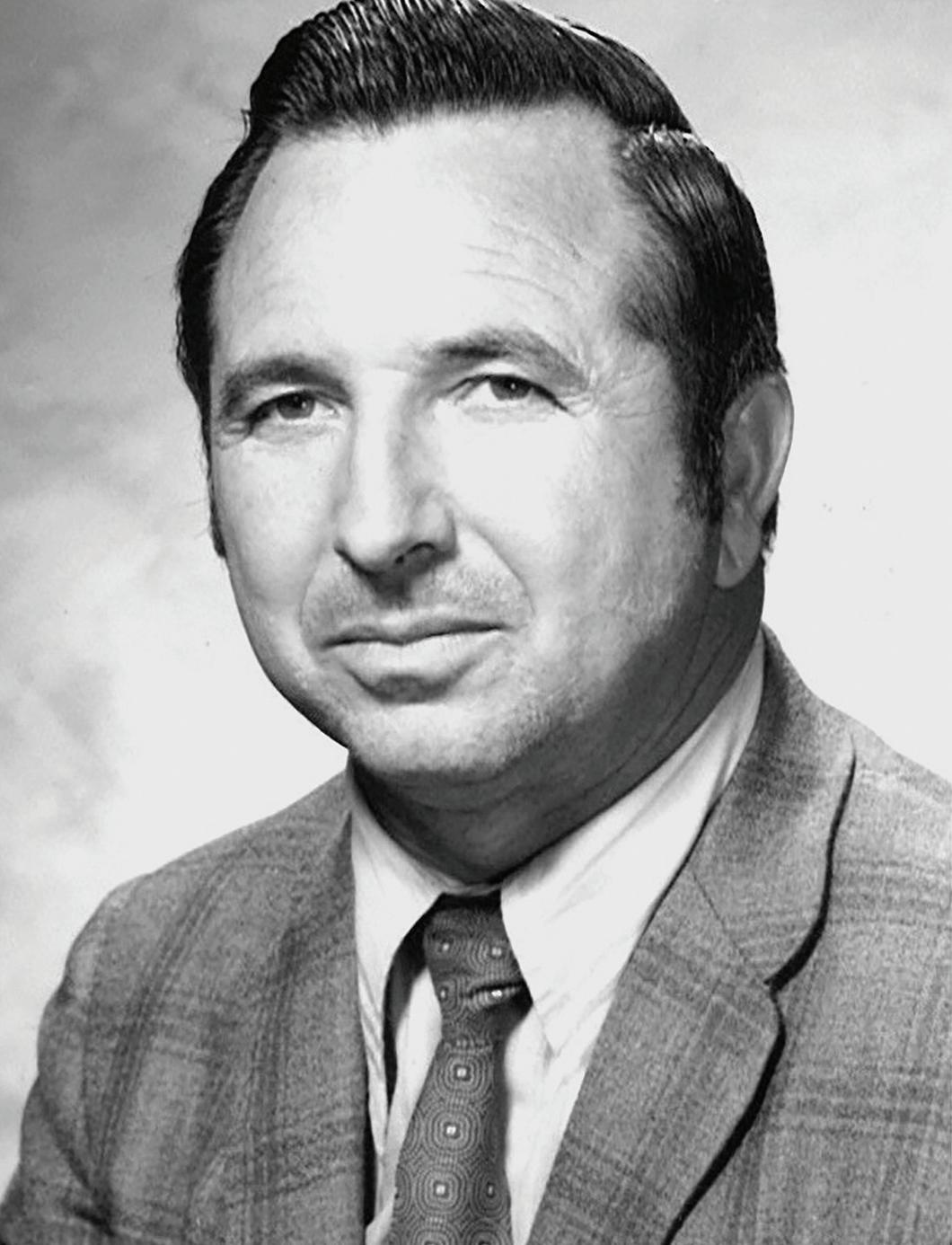
About the Author: Clint Morgan is director of IM, inc. Learn more: iminc.org.
Born in a slab shack at his grandpa's North Carolina sawmill September 25, 1927, Wade Jernigan was the son of a Free Will Baptist preacher. He followed those footsteps, answering the call to preach at age 17, six months after conversion. Sixty remarkable years of ministry followed. Jernigan organized 23 churches, served as a home missionary, educator, and college president. He began serving on the national General Board at 25, Commission for Theological Integrity at 29, chaired the national Home Missions Board at 31, and was a college president at 41. He was a prolific writer and revival speaker. Longtime friend Jack Williams once wrote, "Wade went, even when it hurt and was inconvenient. If he pushed you, he pushed himself harder. He showed up first, stayed later, and gave whatever it took to get the job done. No church was too small and no task too great." Why not start your own financial legacy with an endowment through Free Will Baptist Foundation?
God has ordained we work together within His Body to accomplish His plans. We are fully committed to working alongside those to whom God directs us.
Many years ago, my husband and I—a couple of kids with a calling—started out on an adventure that became a lifetime of ministry in Japan.
Throughout that 38-year adventure, we have been the recipients of countless gifts and acts of kindness from Free Will Baptist women. WNAC has blessed us with baby showers, provision closet items, offering plates, Bibles, hymnbooks, Sunday School curriculum, monetary gifts to remodel church buildings, gift cards, pajama showers, and much more.
In the early days of our work, women often provided us with hard-to-find items. I know for certain that if you look far enough back in one Florida district’s minutes you will find an item of business that reads: “We discussed Donnie and Ruth’s need of deodorant!”
J.R. Tolkien’s famous book The Hobbit was subtitled There and Back Again. Like Bilbo Baggins, we have completed our adventure to Japan and are heading “home.” But as Bilbo also said, “The road goes ever on and on.”
I am excited to begin the next adventure of giving back to the denomination that has so faithfully given to me. As I consider the legacy of WNAC, my heart swells with pride and gratefulness for all that has been accomplished for God’s Kingdom. WNAC history is an incredible memoir of selflessness, generosity, and behind-the-scenes sacrifice. Missionaries have literally been able to remain on their fields of service because of Free Will Baptist women. Hundreds of women around the world have come to know Christ as a result, and I am personally acquainted with many of them—your Japanese sisters in Christ. Your gifts, prayers, and projects have made an eternal difference.
No one could possibly have more appreciation for WNAC history than I do. Even before my Japan adventure, I was the child of “home missionaries” John and Leah Postlewaite in the Pacific Northwest. I literally have slept on Provision Closet sheets my entire life. Having said that, I am excited about the direction God is leading WNAC in the future. We want to continue to do our part to fulfill the Great Commission while also focusing on discipling women of all ages in the U.S. and beyond. We want to come alongside women as they serve Christ as lights in the world around them.
After officially beginning the role of director November 1 of this year, I plan to spend the next several months simply listening. After all these decades in Japan, I need to hear your concerns, dreams, ideas, and hopes. And I do mean all of you. From age 12 to 112, I want to listen to you. Whether you are part of an “official” WNAC group or not, if you are a Christ-follower whose desire is to actively pursue and serve Him, WNAC is for you.
Please join me in praying about the future of WNAC and the transition in leadership. As the light of the gospel dims in the culture around us, our light becomes more conspic uous and effective. Never has our mission been more vital than in these days. I am looking forward to all God has prepared for us to do for and with Him.
About the Author: After serving as a missionary in Japan for almost four decades, Ruth McDonald will begin her new role as director of WNAC November 1. Learn more: wnac.org.
What would people be most surprised to learn about you?
I’ve never done it, but I’ve always wanted to try ziplining.
(Besides your parents) Who has had the most influence on your life?
After 41 years of marriage, I’d have to say my husband.
Can you share your conversion experience?
I gave my heart to Jesus and was baptized at six years old after becoming aware of my sinfulness. That first, simple faith has grown into a love for God that has lasted a lifetime.
How did you meet Donnie?
And how would you describe him?
At Welch College, of course! I always say I “swept him off his feet,” as my campus job was to sweep the floors and empty the trash cans in the basement printshop where he worked.
My first impression of him was that he was so thoughtful...and I still think that is true. He is also patient and consistent, a man of integrity and a servant leader.
As you look back over your life, how did God prepare you to serve as director of WNAC?
I grew up in a church planting home and served 38 years with IM. This has given me experience with all kinds of women around the country and the world, and it has been my joy to be involved in women’s ministries all along. I also enjoy communicating with women through public speaking and writing.
For what one thing are you most grateful?
The faithfulness of God
Can you share one (or more) humorous stories from your time in Japan?
Many, many language mistakes:
• Ordering “two airplanes” at McDonald’s
• Saying I sang by refrigerator light (instead of candlelight)
• Serving coffee with salt instead of sugar because I couldn’t read the label
What was your greatest challenge as a missionary?
Definitely the language! I’ve wanted to wear a placard that read: “I’m really not as stupid as I sound.”
Can you name a few of your greatest encouragers while on the mission field?
Many Free Will Baptist women sent care packages and notes of encouragement over the years. Our home church, Cross Timbers in Nashville, has been so faithful, as have many individuals who have loved and supported us since the beginning.
We’re especially thankful to those who have loved on our four children. Wendell Leckbee of North Little Rock, Arkansas, received an impromptu offering for them one time, just to let them know they were loved.
Dale and Sandra Bishop became family to us as they consistently encouraged and listened. What one thing would you like to say to Free Will Baptist women as you anticipate your new role?
I look forward to getting to know you, and I want to listen and learn how God is leading and using you.
I am praying God will help us encourage and engage women of all ages as we focus on growing disciples of Christ in a rapidly degenerating culture. I want WNAC to be seen as relevant and vital for every Free Will Baptist woman.
Mary R. Wisehart Scholarship assists young women studying at Free Will Baptist institutions for higher learning in the United States.
Miley International Scholarship helps international students pursue Christian education within the U.S.
Cleo Pursell International Student Scholarship helps international students in their own country or region of the world prepare for ministry. These important scholarships are funded by individuals, groups, and churches just like yours.

Send donations to:
WNAC, PO Box 5002 Antioch, TN 37011
Or donate online: www.wnac.org
Around AD 370, when 16-year-old Augustine stepped from the waters of the public bath where all sorts of sins were committed, his father spied him and smiled to think he might soon become a grandfather. What gladdened Augustine’s pagan father, however, grieved his Chris tian mother. Along with sexual indulgence, the teenager stayed out all hours with ne’er-do-wells. One night, he and his buddies stole pears from a neighbor, climbing each tree, nibbling just a bit from each piece of fruit, and then throwing them to the hogs below. He later confessed the appeal of the theft: “It was foul, and I loved it.”
Augustine eventually pursued a career in rhet oric. Meanwhile, the child his father had anticipated wasn’t long in coming. Adeodatus they called him, “a gift from God.”
Just before his 30th birthday, Augustine sailed for Italy where the glory of Rome occupied him for a year before heading for Milan. Seek ing to sharpen his craft, he attended the preach ing of the eloquent Ambrose. His interest wasn’t religion, but he couldn’t hear the minister’s oratory without drinking in the truth he expounded. Listening, he realized his earlier rejection of Christianity had been misplaced.

Of course, accepting Jesus’ teachings as true doesn’t make one a Christian. God wants the heart, not just the head. To be saved, one must advance beyond the porch of truth into the house of trust. Augustine was not far from the Kingdom but not in it. His final move to faith
came when a friend shared his testimony. Augustine recalled: “Thou, O Lord, while he was speaking, didst turn me round towards myself, taking me from behind my back where I had placed me, unwilling to observe myself; and setting me before my face, that I might see how foul I was, how crooked and defiled, bespotted and ulcerous. And I beheld and stood aghast; and whither to flee from myself I found not.”
He realized he hadn’t been honest with God or himself. He’d been praying, “Give me chastity, but not yet.”
Shortly after hearing his friend’s testimony, Augustine was walking in a garden when from a nearby house, he heard a child saying, “Take up and read.” Considering this as direction from God, he walked to where he’d laid a copy of Romans and read the first passage he saw: “Not in rioting and drunkenness, not in chambering and wantonness, not in strife and envying. But put ye on the Lord Jesus Christ, and make not provision for the flesh, to fulfil the lusts thereof” (Romans 13:13–14). Those words prompted faith and swept his soul into God’s Kingdom.
Augustine visited Ambrose, and soon, on Easter morning, behind curtains and stark naked as was the custom, he was lowered three times under the waters of baptism. As he stepped out of the water, his Father spied him and smiled.
About the Columnist: Paul V. Harrison has pastored Madison FWB Church in Madison, Alabama, since 2015. Previously, he pa stored Cross Timbers FWB Church in Nashville, Tennessee, for 22 years. He was an adjunct professor at Welch College for 17 years, teaching church history and Greek. Paul is the creator of Classic Sermon Index, a subscription-based online index of over 66,000 sermons, with clients including Harvard, Baylor, and Vanderbilt, among others: classicsermonindex.com.
The previous issue's "Primary Source" contained a particularly egregious editorial error. Sentence two in the first paragraph should read: "Those whose faith does not change their lives may not prop erly be called Christian." Apologies from the editor.
“But put ye on the Lord Jesus Christ, and make not provision for the flesh, to fulfil the lusts thereof” (Romans 13:14).
The following column features an interview* between Brad Ransom and Karl Vaters, teaching pastor at Corner stone Christian Fellowship in Fountain Valley, California, and author of The Church Recovery Guide, Small Church Es sentials, The Grasshopper Myth, and 100 Days to a Healthier Church.
Ransom: Karl, you have been the pastor at Cornerstone for 29 years. Can you talk about the importance of the longevity of a pastorate, especially in creating a healthy culture in a church?
Vaters: Without question, the most perilous time for a church occurring on a regular basis comes during pastoral transition. Sometimes, it can result from moral failure, the people don’t like the pastor anymore, or maybe the pastor doesn’t like the people anymore. Even when it is a healthy transition and people are sad to see the pastor go, pasto ral transitions are risky times.
Reducing the risk during pastoral transition is a huge part of helping your church build from strength to strength. The easiest way to do that is to find a good pastor/church fit, where the two stay together for a long period of time. Sometimes, a pastor reaches a certain point where he gets frustrated or feels he has done all he can do in a particular way of doing ministry. That’s when you’ve got to do something I call “transition without relocation.” We sometimes have a pastoral culture where, when you reach the point of feeling you need a transition, you assume that means relocating and moving elsewhere.
Consider that perhaps the Lord is calling you to do some thing different where you are now—transition without re location! I’ve experienced four distinct transition without relocation moments in the church I pastor now. Each time, I had to walk the church through the transition: here’s what we need to do, the changes we need to make, etc.
Pastors typically cut and run—not always because we want to leave, but because we think the nudge from the
Lord means we need to be somewhere else. That isn’t necessarily what it means.
Ransom: You mentioned that most of your staffers are part-time or volunteers you hire from within the church. What are your expectations from volunteers and how do you find them?

Vaters: We look for servants—people serving already. We don’t go to someone with a high skill set who has gone to Bible college or whatever. We look around and find people with a servant’s heart. They are already serving the church, putting in the hours, and we help equip them—get the skill sets they need—then put them in charge of the ministry where they have already proven themselves. It’s important to remember when you’re working with a slate of volunteers, you really must be flexible. We are constantly changing when we have staff meetings to dis cuss important matters. Too many times in a church, we set up a structure and require volunteers to fit within that structure. The smaller the church is, the less viable that is. If you have a small church, and you want people to help, you must be flexible! If you find someone with a servant’s heart and particular gifts, you have to say, I’ll take that gifting and plug them in.
Ransom: In your book, 100 Days to a Healthier Church, you describe some things I think would be helpful to our read ers. Could you give us a quick synopsis of the book and how it could help pastors reading this interview?
Vaters: The book’s premise is: What if you gave your church a “full court press” for 100 days? Obviously, it would be a hard and challenging 100 days, but it could help make your church healthier or stop the slide of a church going down and give you a chance to start looking forward again. Wouldn’t that be worth a 100-day commit ment?
This does not start with business practices or our own idea of what the community needs, but who does God say
We think the nudge from the Lord means we need to be somewhere else. That isn’t necessarily what it means.
His church is supposed to be? Jesus said, “I will build My church.” What does it mean to get on track with what God is doing? What has God called us to and what one project might we do to take us a step closer to that? How do we put the team together and at the end, how will we cele brate what has been accomplished? The book basically takes several processes (that took us about 15 years to fig ure out) and puts them into a concise system your church can do in 100 days.
Ransom: In one section, you talk about the importance of assessing your church before you begin this process. Can you talk about how important that is?

Vaters: You don’t know where to start or where to go without doing an assessment first. I strongly encourage pastors to go through the process to make sure they have people around them to walk with them through it.
Ransom: To wrap up, give us a final thought or word.
Vaters: I love small churches, and I love small church pastors. I think they are some of the hardest working, hardest praying, godliest, and most passionate servants in the world. It’s hard to remember that as a small church pastor when so much church leadership instruction is structured around how to get bigger. The often-unintend ed implication is that if you’re not growing, you must be doing something wrong; you must be broken.
I always encourage small church pastors to know the size of your church is not necessarily evidence of brokenness. Your church may be healthy while small, and it may even stay small. That may be the best size for your effective ness. So, be faithful, continue to be obedient to the Lord, and continue to stay passionate and prayerful.
*Adapted from a phone interview
About the Columnist: Dr. Brad Ransom is director of church planting and chief training officer for North American Ministries.
Contact Brad: brad@nafwb.org.
You may be wondering what your gifts to the Mission North America Offering (MNA) accomplish and why you should give. Let me list some ways your gifts impact the growth of the Kingdom of God, and hopefully, these things will encourage you to give generously this year.
Our primary focus at North American Ministries is church planting. We pray regularly for God to call new church planters to take the gospel to areas of North America needing a solid witness. Your gifts to the MNA Offering help our church planters in many ways.
• Church Planter’s Summit is a time of training, encouragement, fellowship, studying the Word, and being with other church planters to pray together and sharpen one another.
• Prayer cards, directories, maps, and other printed materials help promote the ministry of our church planters to Free Will Baptist churches and individuals.
• Training and encouragement are provided for our church planters as directors visit them and offer their time, help, and counsel.
• Deficit accounts are corrected when sufficient funds from the offering go to church planter accounts in the red.

Your gifts to the MNA Offering also help cover travel costs to state meetings and the National Convention each July. Representatives from North American Ministries attend these meetings to share how God is work ing in church plants and other areas of ministry. The offering also provides opportunities for church planters to connect with fellow Free Will Baptists and to distribute promotional materials to remind folks to pray for and sup port the work of North American Ministries.
Your gifts make it possible to operate our home office. While that may not sound glamorous, the office handles accounting, payroll, receipts, and bookkeeping for all church planters. The NAM office is the hub for sharing news of how God is building His Kingdom through various ministries. Your gifts also make it possible to provide assessment, direction, and account ability to church planters. All these things are necessary for effective and efficient ministry across North America.
You may not realize it, but your gifts to the MNA Offering also help fund the various ministries of Master’s Men. The Disaster Response Team, with its equipment, supplies, training, and services, benefits from your offerings. The IMPACT project each year during the National Convention is funded through these gifts. Your gifts help provide Bible studies and support to men’s ministries across the denomination.
Additionally, cross-cultural ministries benefit from your generous gifts. As the Hispanic population continues to grow, cross-cultural ministries work with more estab lished churches and church plants to provide direction and resources to reach Hispanics in their community and establish new Spanish-speaking churches. In addi tion, your gifts help underwrite translation of materials into Spanish and training for new Hispanic leaders through the Hispanic Institute.

North American Ministries also provides endorse ment, support, encouragement, and oversight to Free Will Baptist military chaplains. Your gifts make it possible for the chaplain support officer to provide resources to our chaplains. Our chaplains serve the men and women who put their lives on the line willingly to keep us safe. We do our best to en courage our chaplains and provide the support they need. Your generous gifts help make that possible.
These are only a few of the many ways your gener ous gifts to Mission North America Offering make it possible for North American Ministries to fulfill the task given to us by the National Association. We are praying for and asking our Free Will Baptist people to give generously on November 20 and have set the goal of raising $750,000 this year. Please prayerfully do your part to help us reach that goal.
About the Author: Sam McVay is Church Relations Officer for North American Ministries. Learn more: fwbnam.com.
North American Ministries continues to be the endorsing agent for Free Will Baptist military, hospital, law enforcement, and even Secret Service chaplains. Military Chaplains serve as pastors to military personnel stationed all over the world through Bible classes, services, during illness, to families and fellow officers if death occurs, and during wars and conflicts. Please pray faithfully for the fol lowing Free Will Baptist chaplains:
• Captain Amir Ashoori —Army Reserve, Fresno, California
• Captain Michael Beatty —Fort Leonard Wood, Missouri
• Captain David Dodson —Eglin Air Force Base, Florida
• Major Lee Frye —Fort Stewart, Georgia
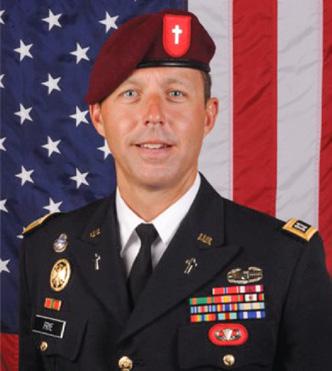
• Lieutenant Colonel Brad Hanna —Oklahoma Army National Guard
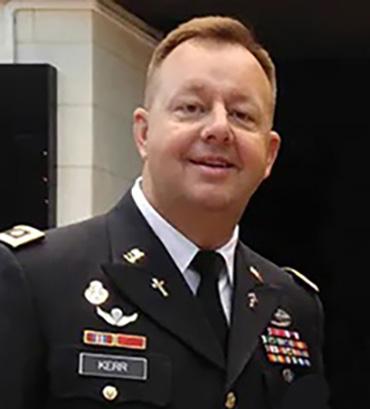
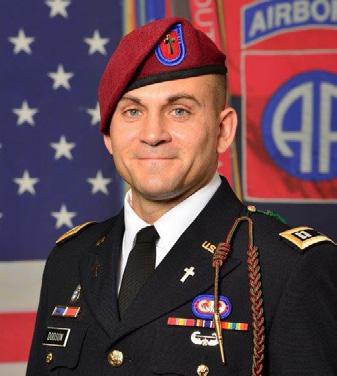
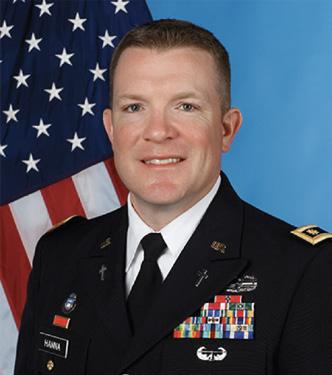
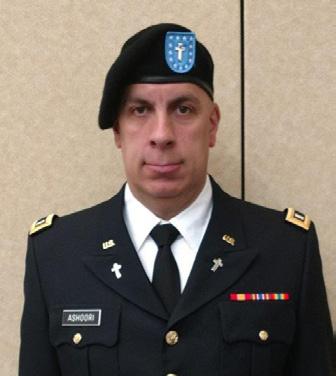
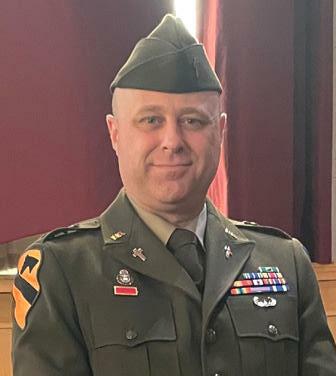

• Lieutenant Hal Jones —San Diego, California (transitioning to Virginia Beach, Virginia, in December)
• Lieutenant Colonel Tracy Kerr —Fort Bragg, North Carolina
• Lieutenant Mark McCraney —Camp Lejeune, North Carolina
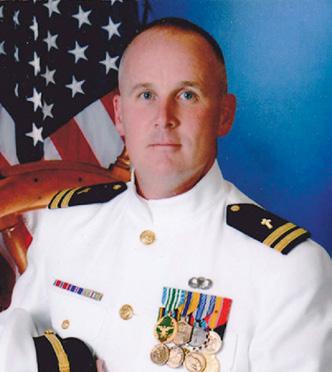
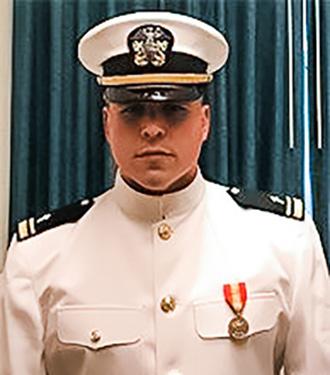
• Major Kevin Trimble —Observer/Controller, Fort Irwin, California
Four chaplain candidates currently preparing for service:
• Lieutenant Matthew Saunders
• Lieutenant Jonathan Truett
• Lieutenant Shaun Hembree
• Lieutenant Elliott Delius
Are you interested in becoming a Free Will Baptist chaplain in the U.S. Military? Chaplains must meet the following requirements:
• Complete 120 hours of undergraduate study in a college or university ending in a Bachelor of Arts degree, a Bachelor of Science degree, or some other qual ified degree.
• Complete at least 72 semester hours of graduate credit at an accredited semi nary ending in a Bachelor of Divinity or Master of Divinity program.
• Be an ordained Free Will Baptist minister in good standing with the denomi nation, with two years professional experience at a Free Will Baptist church.
• Submit the proper applications to North American Ministries and the branch of service in which he desires to serve.
• Be under 46 years of age, have the ecclesiastical endorsement of his denomi national body, and pass a physical examination.
Applicants will be notified by the government when their application is approved.
It may not have been the most church planters approved in a single meeting, but it was the most diverse. In a historic meeting, the North American Ministries (NAM) board approved four church planters to start churches in unique and groundbreaking areas for Free Will Baptists. Ohio natives, Justin and Allison Feight were approved to plant the first and only Free Will Baptist church in the state of North Dakota, in the city of Jamestown. Home to the University of Jamestown and the National Buffalo Museum, Jamestown is considered the motorsports capital of North Dakota and is one of the state’s largest cities. It lies between Bis marck and Fargo with two Native American reservations nearby. The mission field is great in this region with thousands of unchurched people needing the gospel. To learn more about the Feights, their two children Abigail and Benja min, and the work in Jamestown, or to support this ministry finan cially, please visit fwbnam.com/ feight.
Matt and Becky Hanshaw were approved in a unique joint project partnership with the Oklahoma Executive Office, First Oklaho ma District Association, and Bob Thomas Ministries to revitalize
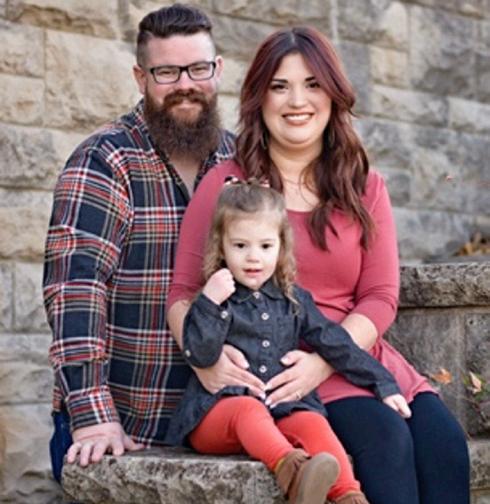

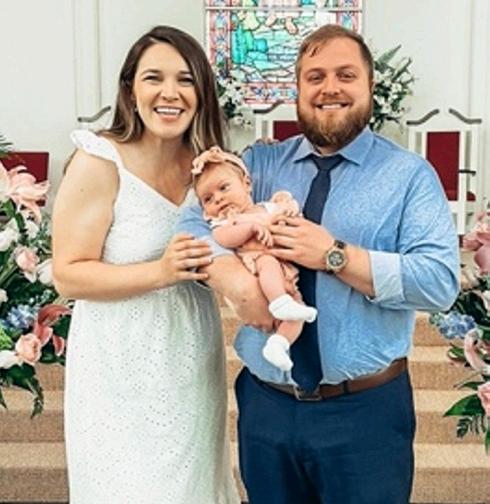
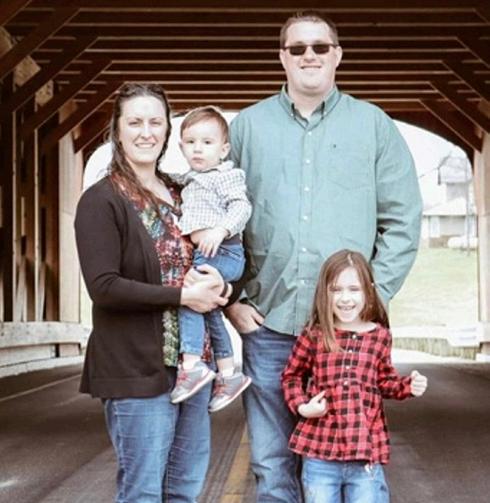
Hilltop FWB Church in Ardmore, Oklahoma. Ard more is in south central Oklahoma, strategically located between Oklahoma City and Dallas/Fort Worth, Texas. Upcoming business expansions are expected to bring thousands of new jobs to Ardmore and increase the population exponentially. Hilltop Church has beautiful facilities in a great location and is ready to move for ward. The Hanshaws have one daughter, Jovie, and are both graduates of Randall University. To learn more, or to support this family financially, visit fwbnam.com/ hanshaws.
Team members Luke and Dalanee Sherman also were approved to go to Ardmore, Oklahoma, as associate church planters with the Hanshaws. Luke and Dalanee are seniors at Randall University. Luke grew up at Cross Point FWB Church in Wichita, Kansas, and Dalanee is from Tuttle, Oklahoma. Luke is passionate about worship ministries and a talented singer and musician. Dalanee has a heart for children and will lead the kid’s ministry at Hilltop. For more information about the Shermans or to support them financially, visit fwbnam. com/sherman.
The Donelson Fellowship (TDF) in Nashville, Tennes see, is a church with a heart to plant other churches and help struggling churches reach their communities with the gospel. TDF approached NAM and the Michigan State Missions Board with candidates Greg and Hailey Smith to replant a church in Ypsilanti, Michigan. Greg is excited to move back to his home state to work in this ministry. Hailey is originally from Georgia. The Smiths have one daughter, Norah. In this partnership, the Smiths will work to build a team and relaunch a strong, healthy church. Ypsilanti lies just west of Detroit and is a culturally diverse city with a great need for the gospel. For more information or to support the Smiths finan cially, please visit www.fwbnam.com/greg-smith.
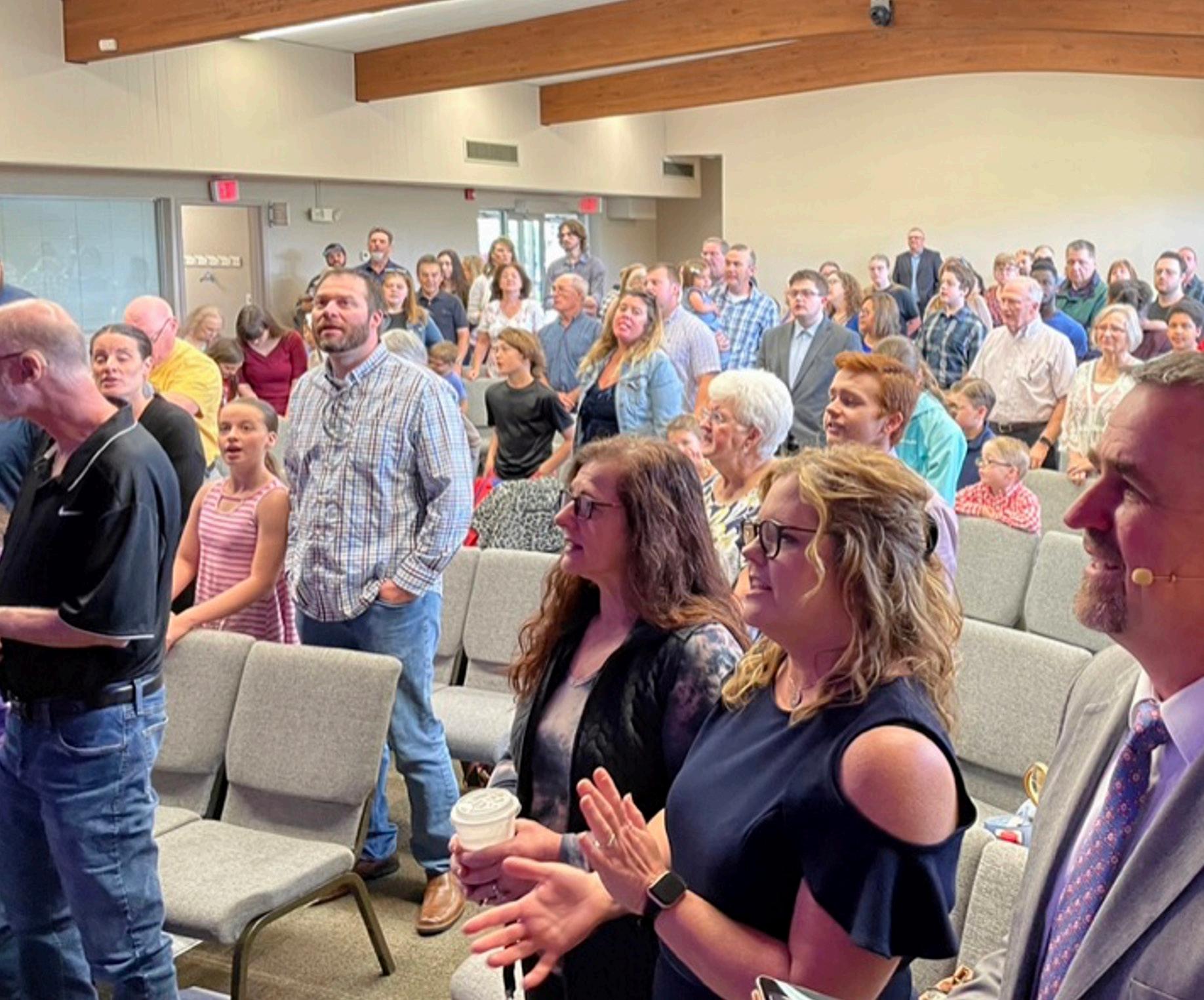
 BY BRAD RANSOM
BY BRAD RANSOM
I’m a grandpa, and nothing is better! I really don’t know what it is, or why it’s so different than being a parent, but something is special about having grandkids. My wife and I have three great kids of our own, and God has blessed us with ten grands. Unfortunately, we don’t live near them, so the moments we are together are special. I’m proud of my boys, and we were always excited to hear of more grandchildren on the way.
Spiritually speaking, we should expect grandchildren, too. The call to make disciples (Mat thew 28:19-20) should be obeyed by every Christian through multiple generations. In other words, I should make disciples (so should you), and those disciples should make disciples (spiritual grandchildren), and those disciples should make disciples (spiritual great-grand children). The problem is, too many Christians don’t make one disciple, let alone multi-
ple disciples who make other disciples. This should be happening with every believer, in every church, and I’m incredibly proud to say, it’s happening at NorthPoint FWB Church in Depew (Buffalo), New York.
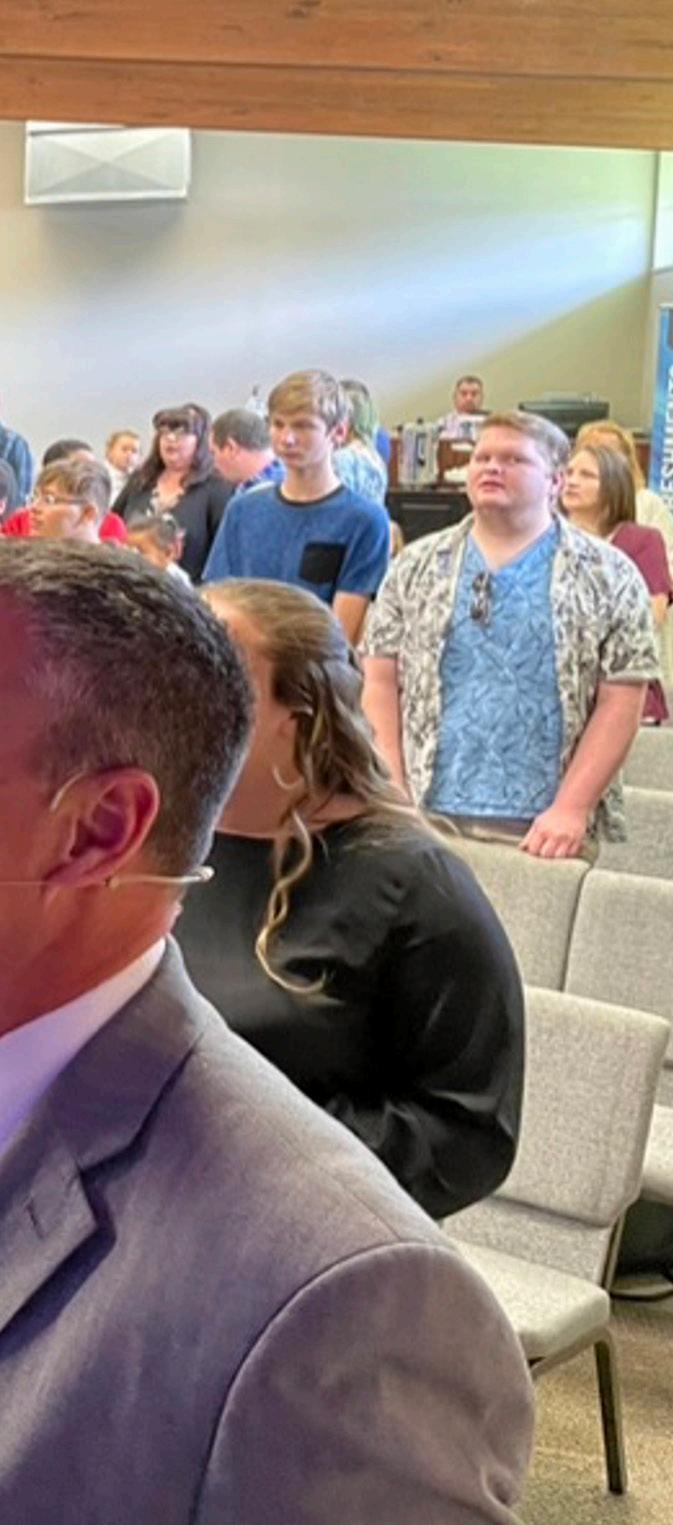
North American Ministries is proud to announce lead planter Brian Williams, his wife Emily, and the rest of their team have led NorthPoint to self-supporting sta tus. On Sunday, June 5, the church officially organized, elected charter members, installed deacons, and set aside a ministerial candidate. To top it off, the church is planting another church 20 minutes from their first location. Talk about making disciples that make disciples—this is it!
Just before the 2020 pandemic, Danny and Dawn Elliott and their family joined the NorthPoint team to learn the area, begin training leaders, and work toward the goal of launching a new church. Several people from the origi nal NorthPoint Church are being trained to go with the Elliott family to West Seneca/Lackawanna, New York, to plant another NorthPoint Church.
Not only has NorthPoint launched the West Seneca church, but since the original church was planted, Tim othy and Amanda York have established a church for the Deaf and hearing impaired. This church meets with the original NorthPoint congregation, but plans are being
made to expand the ministry and eventually have multiple locations for the Deaf and hearing impaired. Again—dis ciples making disciples!
North American Ministries would like to offer our con gratulations to Brian and Emily for leading this amazing work, for going self-supporting, and for continuing the vision by making disciples that will continue to make disciples in Depew, West Seneca, and among the Deaf community.
Although the Williams are now self-supporting, Timothy and Amanda York and Danny and Dawn Elliott continue to work through North American Ministries and remain on church planting support. We ask for your continued financial support for these families as they carry out the Great Commission in this spiritually needy area of the Northeast. Many more churches are needed throughout New York and the Northeast region. Will you stand with NorthPort as they continue to follow the command to make disciples by prayerfully and financially helping them? For more information about the Yorks or Elliotts visit www.fwbnam.com.
About the Author: Dr. Brad Ransom is director of church planting and chief training officer for North American Ministries. Contact Brad: brad@nafwb.org.
Pictured left to right: Danny and Dawn Elliott (lead NorthPoint West Seneca), Brian and Emily Williams (Pastor, NorthPoint Church), Nathan and Meagan Barton (Student Pastor), Timothy and Amanda York (lead to Deaf and hearing impaired).
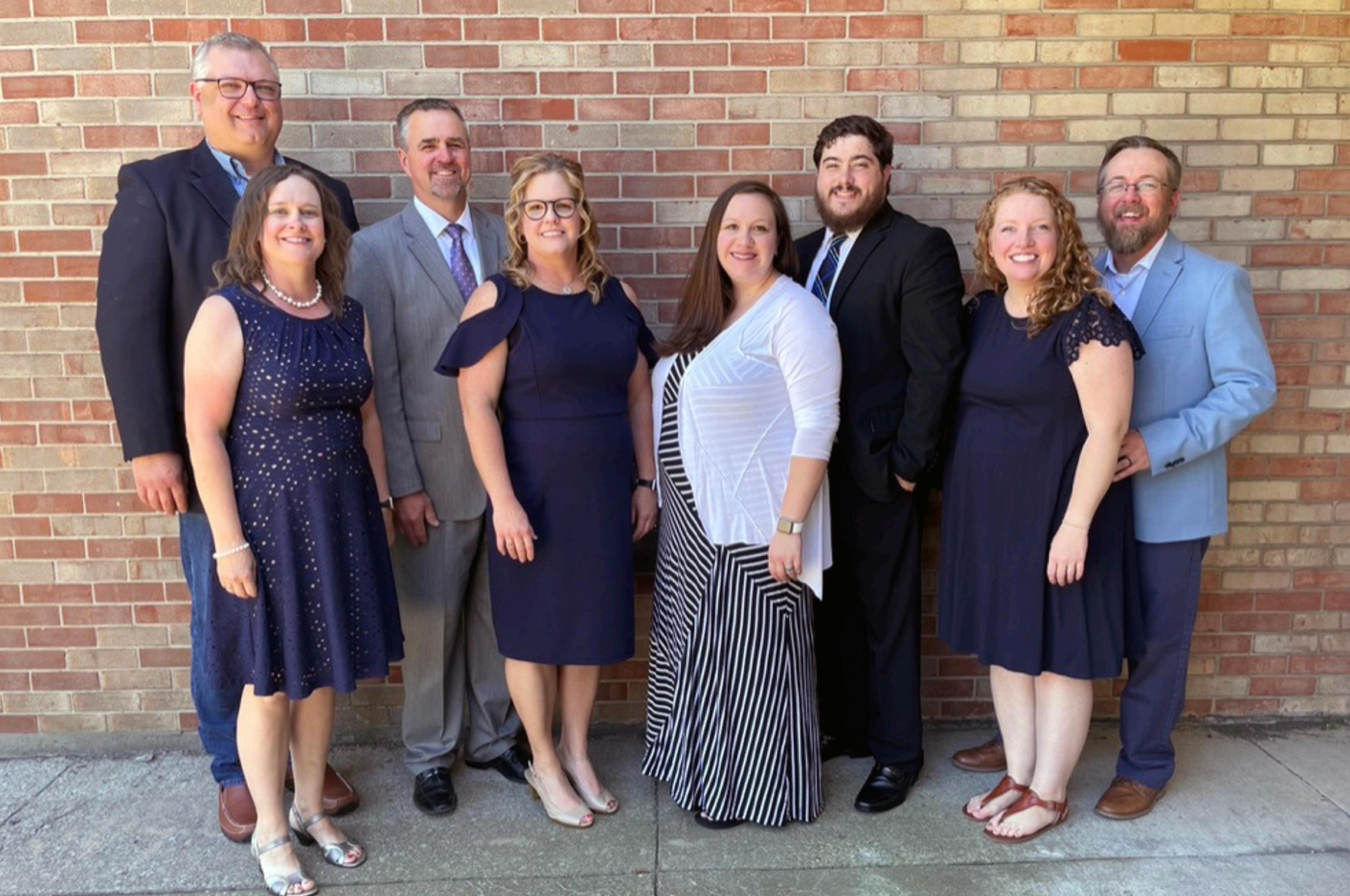
We all know how critical the pastor and his wife are to the well-being of our church. What are the major challenges they face today, and how can we encourage them?

Last Spring, the Barna Group released a survey indicating reasons some pastors have considered leaving the ministry, as well as reasons some pastors are determined to stay in the ministry. First, 42% indicated they had considered quitting full-time ministry which was up from 29% in January of 2021. Of those who considered quitting, the top reasons were the immense stress of the job (56%), feeling lonely and isolated (43%), followed by current political divisions (38%). Other reasons included being unhappy with the effect the pastor role had on their family (29%), not being optimistic about the future of their church (29%), the steady decline of the church (24%), feeling un equipped to cope with ministry demands (19%), and not having what they need to be successful in their job (12%).1
On the other hand, pastors who have not considered quit ting reported experiencing some of the same challenges: immense stress of the job (32%), loneliness and isolation (18%), steadily declining church (12%), unhappiness with the effect the role has upon their family (10%), pessimism about the future of their church (9%), and not having what is needed to be successful in the ministry (4%).
If they experienced the same stressors, though at a different degree, what was the difference? Eighty-three percent of pastors who had not considered quitting said it was because they believe in the value of their ministry. Seventy-five percent said they feel a sense of duty to stay and fulfill their calling in ministry, and 73% were satisfied with their job as a pastor. Proper support was important with 67% saying their family supported them; 59% said they received strong support in their community. This emphasizes the importance of strong and encouraging relationships to help pastors and their wives continue in the ministry.
To identify the kind of support and encouragement Free Will Baptist pastors and their wives need, we surveyed our pastors last spring. We found their key concerns to be as follows: lack of volunteers (54%), church decline (44%), burnout (40%), and a shifting culture (37%). Coping strategies they reported utilizing to continue in the minis
1 Barna Group, April 27, 2022. Pastors Share Top Reasons They’ve Con sidered Quitting Ministry in the Past Year. Assessed at https://www.barna. com/research/pastors-quitting-ministry/
try included talking with a pastoral friend (66%), confid ing in their wife (63%), and discussing challenges with a mentor (35%).
When we asked what they thought would be beneficial to them in dealing with these challenges they indicated relevant seminars (47%), recommended helpful books/ resources (46%), mutual encouragement support group (44%), coaching (32%), retreats (32%), and pastoral coun seling (29%). When asked to rate their interest in a pastor support group on a scale of 1 to 10 the average rating was 7, as was pastors’ retreat. Interest in professional Christian counseling received an average rating of 5.
For those interested in counseling, cost/affordability was most important (67%), followed by confidentiality (54%), competence (42%), proximity (42%), and having an online option (32%). Although we surveyed pastors rather than their wives, the number one resource they believed their wives would desire was a mutual encouragement support group (54%), followed by retreats (49%), recom mended helpful books/resources (48%), relevant seminars (38%), and counseling (23%).
As a result, we are seeking to provide new resources for pastors and their wives. This fall we began using Zoom discussion groups that involved looking at resources on these issues (e.g., resilience, church revitalization), as well as outlets where pastors could get together via Zoom to talk (e.g., pastor hangouts). These groups have been led by various pastors. Similarly, Mrs. Carolyn Dwyer is available to talk to interested pastors’ wives, and provide online mutual encouragement groups as a safe place for ministry wives to get together to vent and discuss issues they face. Lastly, as one of our Refresh resources made available by our partnership with FWBNAM, we began making profes sional counseling available via Zoom with former Free Will Baptist church planter and licensed professional counselor, Tom Jones. If you are interested in learning more about any of these opportunities, please call 877-767-7659 or email questions@nafwb.org.
About the Author: Eddie Moody is executive secretary of the National Association of Free Will Baptists. Find more resources for pastors, churches, and church leaders: nafwb.org.
The same could be said for casting vision. A vision is the ability to consider or plan the future with imagination or wisdom. A vision statement is an inspirational, idealistic statement of what a company or organization is striving to become. Companies use vision statements that are concept based: to nourish people and the planet (Whole Foods). Or quality-based: to move with velocity to drive profitable growth and become an even better McDonald’s serving more customers delicious food each day around the world (McDonald’s). These statements let every person inside or outside the organization know what is expected and hoped to be the outcome.
This business concept has been popular with churches for “casting a vision” or holding vision Sundays. The idea is that church members get a preview of what the church leadership wants to achieve during the year. At times, the underlying vision for the church gets overshadowed by
current happenings. For example, the church vision is to reach the community, but the happenings are VBS, egg hunts, Christmas plays, etc. What is true in the business world is also true in the church world. Casting vision is not the same as catching the vision.
Developing a vision for your ministry is not easy, but getting others to catch the vision is even more challenging. But it is not impossible. If you go into the local McDon ald’s and ask an employee what the company vision is, you might get a blank look. The same is probably true for most people in your church. So, how do we ensure the vision is caught, and we aren’t just standing on the shore?
First, put the vision into print or picture or both. Spo ken words tend to get lost or replaced before they have the chance to become engrained. If the vision is important, write it where people will see it: the wall of the church, the
“There is a fine line between fishing and just standing on the shore like an idiot.” —Steven Wright
tag line on your email or social media—anywhere people will see it and remember it. Use pictures to reinforce the vision. Be descriptive in your vision casting, so people understand the “why” behind the vision statement.
Next, make sure the team/church/ministry can align with the vision. If people cannot align with the vision cast, the vision will slowly die and cease to exist. With out alignment, you will not move in the same direction quickly. And, if you do move in the right direction, it will come with more wear and tear than is healthy for long-term sustainability. When our car alignment is out of whack, it damages and strains our vehicles, leading to repair or replacement. Alignment with our team allows us to build a foundation of commitment, cooperation, and community while giving the team members (congregation) ownership in the vision. The ministry vision becomes their vision as well.
Finally, share the vision frequently but uniquely, and live it out before others. Once we tell everyone about the vision, put it on the wall, and make it our email tag, we think everyone is familiar with the vision. But, as Alan
Castel said in Psychology Today, “one of the near-univer sal laws of psychology is habituation—we stop noticing things we see or hear many times.” For example, think about the logo on the back of your phone without look ing at it. Could you sketch it? In a study by the Quarterly Journal of Experimental Psychology, only one out of 85 sketched it correctly. If we don’t change the delivery, we could miss the forest for the trees.
A clear, simple vision should be the baseline of everything in our ministry. Everything that happens ultimately points back to fulfilling the vision. From our structure and out reach to the way we handle our financial plan, the vision should govern all actions. Being sure our team—our con gregation—is aligned with the vision lets us move forward smoothly and efficiently.
About the Author: John Brummitt became director of the Board of Retirement in January 2016. He graduated in 2011 with an MBA from Tennessee Tech University. A 2004 graduate of Welch College, he has been with the Board of Retirement since spring 2006. Find more tools to help you live your best life at BoardofRetirement.com.
As I write this article, the temperature is hovering around 100° outside, yet professional football players are dealing with long, hot, two-a-day practices. When you read this article, a chill may be in the air. Depending on where you live, frost may be nipping at the grass in your front yard. Yet, those same players are taking to the field every weekend. Teams need good leaders. When I think about leadership and football, I think about the coach who wore the hat.
Born 77 years to the day before 9/11, he died 17 months before that infamous date etched itself into our hearts and minds. One of the greatest football coaches of all time, fans easily recognized Thomas Wade Landry by the fedora he wore at every game, along with his dapper suit and tie.
After playing college football at University of Texas and studying industrial engineering, Tom played his first year of professional football with the New York Yankees. Yes, football . Then he played for the New York Giants. During his final two years with the team, he added assistant coach to his playing role.
Coach Landry served as the Giants’ defensive coordinator opposite offensive coordinator Vince Lombardi. These great coaches helped their team win the NFL championship in 1956 against the Chicago Bears, with repeated (unsuccessful) attempts in 1958 and 1959.
In 1960, Coach Landry began his most memorable coaching job. The NFL expanded to Dallas, Texas, and Tom
Landry became the Cowboys first head coach. After going winless in the first season and not winning more than five games the following four seasons, Coach Landry received an unprecedented ten-year extension to his contract. He quickly turned his young team around. The NFL named Landry Coach of the Year after he led his expansion team into the 1966 championship game against the Green Bay Packers. Hall of Fame-bound Coach Lombardi’s team won the game.
During the next 19 seasons, Landry’s teams achieved a professional sports team record of 20 consecutive winning seasons. The Cowboys won five NFC Championships, along with Super Bowls VI and XII. Coach Landry’s tough defensive coaching led his team to become the first in Super Bowl history to deny its opponent a touchdown during the 24-3 defeat of the Miami Dolphins in Super Bowl VI. The Super Bowl XII victory continued to high light Landry’s defense. And, for the first time, defensive linemen won the MVP trophy, which was split between defensive tackle Randy White and Harvey Martin, defen sive end.
A truly great professional football coach, Landry may have been well-known for his fedora and suit, but it was what was inside the man that truly made him successful. Coach Landry rarely had a game plan or playbook in his hand; they were always in his head. The head coach knew what he wanted to accomplish and implemented strategies

to see it happen. I draw four principles from his on-field leadership that apply to cross-cultural ministry.
Focus on the BIG picture. Good players win football games, but great coaches keep the team in a position to win games. Our IM missionaries in Bulgaria, Ecuador, France, Japan, Kenya, and Spain form a team for each of their countries. IM’s mission statement and six major tasks provide focus for all they do.
Utilize your influence. Five of Landry’s assistant coaches eventually became NFL head coaches. A few began as play er-coaches, just as he did in New York. These player-coaches understood the play er’s challenges on the field. Merging those challenges with a coaching mentality led them to encourage players to follow a coach’s strategies and ideas.
Today, three couples influenced by IM missionaries serve on our field teams. Because of the work of missionaries before them and of those today, these three couples are called national missionaries. Though not born in the USA, Trif and Vanya in Bulgaria, Jonathan and Michelle in France, and Manu and Noemi in Spain serve in the same capacity as other IM missionaries because of those who influ enced and trained them.
The head coach knew what he wanted to accomplish and implemented strategies to see it happen.
Press on. I turned seven the September before the Cowboys won their first Super Bowl. One of my most prized birthday gifts was a white football helmet with a blue Dallas Cowboy’s star painted on it. Looking back, I was a die-hard Cowboy’s fan, even before they won their first championship.

In researching the life of Coach Landry, I discovered many things I didn’t know. The fact he received that tenyear extension to his contract the same year I was born seems kind of mystical. The record at that point in time— 13 wins, 38 losses, 3 ties—is noteworthy. Many years later Coach Landry said, “That was the most significant thing that ever happened to me.”
Our IM missionaries, like the rest of the world, keep pressing on during a world-wide pandemic which, though supposed to last two weeks, continues to impact lives across the globe two years later. Not only did our mission
aries press on, they also became more innovative, creative, and determined to continue the ministries the Lord placed before them.
Look for ways to be creative. Landry received titles like “America’s Coach” and “the Great Innovator.” The first came because of his team’s growing popularity as “Ameri ca’s Team.” The second personified Tom Landry the man, the coach. His innovation led to a well-known defensive alignment called the 4-3 and the Flex Defense. Though used constantly in football today, when Landry’s teams refined and perfected it during his early days of coaching, they were matchless. Landry’s passion for great defense created a scheme that worked like an industrial engineer had designed it. He also perfected other strategies, devel oping creative offenses to beat his innovative defenses.

Although the “shot gun” formation had long been used, Coach Landry and his Heisman Trophy-winning quar terback, Roger Staubach, perfected the offensive scheme. The Flex Defense, the Shot Gun, Motion Offense, and speedy defensive ends were trademarks of Dallas’ winning seasons. The young expan sion team was not always overstocked with talent, but Coach Landry took everything he had and used innovation to put winning teams on the field every weekend.
May the Lord chal lenge each of us to continue to live and lead as we find creative ways to win others to Christ.
As director of field personnel, I want to thank supporters and churches who continued to pray and give to IM missionaries throughout this challenging two years. Though finances and health were not always certain, your faithfulness, God’s provision, and our missionaries’ stead fastness remained.
About the Author: Curt Holland, a former missionary to Brazil, is director of field personnel for IM, Inc. Learn more: iminc.org.
Antioch, TN— IM consistently evaluates organizational needs and strategies. Retirement, changes in health or fam ily dynamics, unforeseen opportunities, and more lead to staffing changes both in the office and around the world.
Director of Member Care and Mobilization and Candi date Shepherd Neil Gilliland tendered his retirement at the April board meeting, effective December 31, 2022. Neil and his wife Sheila served under IM as dorm par ents at a school for missionary kids in Côte d’Ivoire from 1980-1988. After their return, Neil completed his M.S. and Ph.D. in counseling psychology. Hired as director of member care in 2001, Neil has served at IM for 21 years.
ETEAM coordinator Hanna Mott will step down from her position December 31, 2022. She has shepherded hundreds of high school students through cross-cultural service over the last decade.
New arrivals include: Andy Yerby, a Welch College graduate with a degree in international business, joined the financial operations de partment October 2021. He serves as financial operations assistant.
Lauren Herren will join IM as ETEAM coordinator in January 2023. A graduate of Welch College (A.S. in science and biblical theology) and Belmont University (B.S.N.), she has participated in missions in various ways throughout her life.
Transitions for missionary staff require leaving a muchloved ministry for one God provides elsewhere. These gut-wrenching shifts in ministry often require just as much obedience and faith in God’s direction as answering the call to go overseas.
Donnie and Ruth McDonald invested 40-plus years in church planting in Japan. Ruth has accepted an invitation to lead Women Nationally Active for Christ (WNAC). Focused on helping women fulfill the Great Commission in their homes, around the corner, and around the world, WNAC is a great fit for her missionary heart. Donnie will continue to serve as a missionary while working with the development department, promoting Go Global and mis sions-focused education across the denomination. Arriving
in the States at the end of October, they begin their new roles November 1, 2022.
In a similar scenario, after 25 successful years in Spain, Tim and Kristi Johnson returned to the States in 2021 to serve as missionaries-in-residence at Welch College. Tim began serving as program coordinator and instructor for the intercultural studies department August 2022. As he trains future missionaries, Kristi began working in the IM office as development communications manager on Sep tember 1. Her focus is growing the annual World Missions Offering (WMO) by telling IM’s story.
Jaimie and Tammy Lancaster have extended their min istry beyond Uruguay, where they devoted 20-plus years to church planting and training. As assistant director of field partnerships, Jaimie will assist Kenneth Eagleton in his role of supporting growing field partnerships. Nine countries (Bangladesh, Brazil, Central Asia, Cuba, India, Ivory Coast, Pakistan, Panama, and Russia) should soon expand to ten as Uruguay joins these ranks. Still working as missionaries, the Lancasters will promote IM’s work through partnerships.
For over 30 years, Nathan and Linda Snow spread the gospel to the Japanese on the island of Hokkaido. For several years, in addition to his IM duties, Nathan has served as president of JEMA (Japan Evangelical Mission Association), an organization for protestant missionary agencies and missionaries. The growth of JEMA and Nathan’s responsibilities in its ministries to missionaries necessitated greater time commitment and a move to Okinawa. Japanese Free Will Baptists tasked Nathan with exploring church-planting opportunities in this area as he devotes more time to the JEMA role. Linda, a licensed teacher in the U.S., will teach at Okinawa Christian School International. Approximately 80% of the students are non-Christian. The Snows continue with IM while serving another ministry.
Within the office staff, Leslie Nichols will transition from student ministries coordinator to director of mobilization January 1, 2023. She will organize, strategize, coordinate, and oversee all student ministries, seeking to instill a heart and mind for missions within upcoming generations.
Cuba— IM’s General Director Clint Morgan and Director of Field Partnerships Kenneth Eagleton attended the 80th anniversary celebration of the Cuban National Confer ence, August 3-8, 2022. Pop and Mom Willey served as pioneer missionaries to Cuba from 1940-1960. In 1942, they organized new churches into the Cuban National Conference.
Cuba’s current fuel shortage prompted the convention to host seven regional celebra tions. The theme, “Eighty Years of Victory in Jesus,” heralded the Cubans’ dependence on Christ as they persevere through difficult decades of ministry.
Both men spoke during the
regional meetings, attending the first service together. Thereafter, they journeyed to separate locations, traveling over 600 fatiguing miles between them.
Though several congregations could not access transpor tation to attend their regional meeting, people flooded the hosting churches. The estimated total attendance for all gatherings ran 1,500-1,600 for the three- to four-hour services.
During a service at the Cedars of Lebanon Bible Institute, leaders recognized six people who personally knew Pop and Mom Willey and were with the original church plant for at least 80 years. Clint also witnessed the graduation of 23 students from the Bible Institute. Three received master’s degrees.

“Please join me in praying for the Cuban people,” Clint urged, “They face one of their worst economic crises with shortages of electricity, fuel, food, medicines, and all basic necessities.”
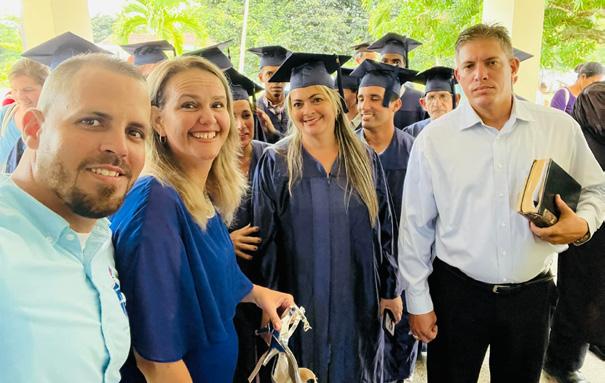
Antioch, TN— Don Matchett, director of development, noted, “I am amazed and thankful for the generosity of our churches and individuals who give sacrificially so un reached people can hear the gospel. As we come out of the COVID years, it is thrilling to see God’s people engaged in taking the gospel to the ends of the earth.”
• Shane and Joy (THP) achieved their financial benchmarks in a scant three months stateside. They returned to their assignment August 23.
• Doug and Miriam Bishop (Japan) departed June 20, 2022, for their ministry in Sapporo. Additional teammates continue to seek funding to assist them in planting a new church.
• Daniel and Shelby Culwell (Japan) received career status July 2021 and departed for Japan September 21.
• Jack and Ashley Ketteman (Japan) received career status July 2021 and returned to Japan August 31.
• Shannon Little (Japan) returned to Tokyo to serve at Good News Chapel October 5. With the departure of the McDonalds, she will take on additional responsi bilities.
• Emily Petty, appointed December 2020 for a twoyear internship in Japan, became fully funded in August and left for Tokyo September 29.
• Jonathan and Amy Postlewaite (Bulgaria) arrived May 29 and departed August 29 after receiving ful ly-funded approval within a three-month span.
• Joel and Lydie Teague (France) returned to their ministry on August 4, four months after their arrival in the States.
Three missionary families and four young adults continue stateside seeking prayer and financial support. To learn more, visit iminc.org
Student Missions— ETEAM student missions cele brated 30 years this summer, sending 70 students and 14 leaders to seven destinations. The ministry, initiat ed in 1992 by former missionary to Brazil Ken Eagle ton, provides high school students the opportunity to spend three weeks learning and serving cross-cultural ly. Find more information at iminc.org/go
Pakistan— A youth conference in Pakistan attracted 500 students in June. Many accepted Jesus as Savior.
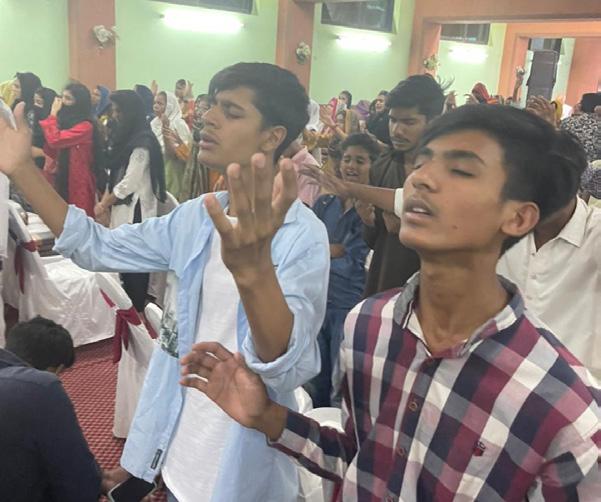
Uruguay— El Canaan FWB Church in Santa Teresa, Uruguay—the first FWB church established in Uruguay—celebrated its 60th anniversary during the month of August. Don Casildo Trinadade pastors.
Student Missions—Twenty-six college students served overseas during the summer of 2022. Five students served in the capacity of overseas apprentices with missionaries and 21 young adults participated in CMP (College Missions Program). CMP 2023 opportunities and applications (due October 15) are available at iminc.org/go
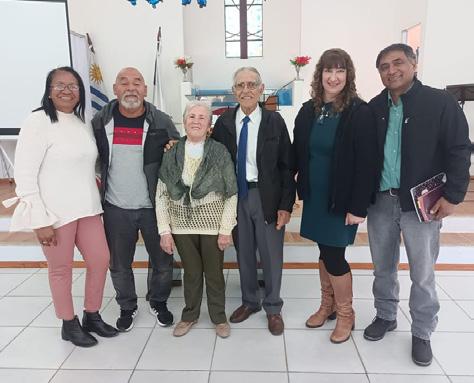


I love words. I hoard them. They are strewn everywhere. Scribbled on sticky notes or scraps of yellow legal pads.
Highlighted in newspapers and magazines, ripped out and stashed in a shoe box or fat manila folder. Gallimaufry, ell, unwept, infodemic, syzygy, yammer, dontopedology, mere, logorrhea—dozens and dozens of them. Long and short. Big and little. Pretty considerable much of them.

And then there are phrases like pretty considerable much.
I like those, too. In July 1789, John Mathews led a surveying party into the newly established Northwest Territory, then called Ohio Country and now the states of Michigan, Ohio, Indiana, Illinois, and Wisconsin. “Measureless wilderness” was on all sides, he said. Fear of native tribes loomed large. After all, the surveyors were intruders into tribal territories. President Washington and the new Congress considered the territory theirs because the British ceded it to the U.S. in the 1738 Treaty of Paris at the end of the Revolutionary War. The tribes rightly considered it theirs.
Mathews knew he and his men were in “pretty consider able much” danger, according to David McCullough in The Pioneers. A month later, in early morning, they were attacked. Most were killed though Mathews escaped with nothing but his hat and shirt, as the story goes. Pretty considerable much turned out to be an apt description.
We need apt words—pretty considerable much of them. Take the word tyranny. Often used to label cruel and despotic governments or leaders, its origins date past the Greeks to the Iron Age Lydians of Asia Minor. Just this week I came across it twice, used metaphorically by two Christian writers in the phrase “the tyranny of things.” Both George MacDonald and A. W. Tozer used the phrase to warn of a tendency toward excessive acquisitive ness, greed for “stuff.” Greed is tyrannical, they said, cruel and despotic. A tyrant.
Logophiles love words. I do, too. But truth is, I’m just a word nerd. I like them, want them. They intrigue me, so I go to the dictionary or online for their meanings and ori gins. Most I never actually use, especially the really long or obscure ones.
Take zenzizenzizenzic, for example, an obsolete six-syllable noun meaning the eighth power of a number. It has more Zs than any other word in the Oxford English Dictionary I like it but won’t use it. Or gallimaufry, a noun describ ing a hodge-podge or confused jumble, or even a hash or ragout. Its origin dates to 1500s French, where it proba bly came from words meaning to make merry, live well, eat much —or indulge too much. Someday, I might use gallimaufry to talk about gluttony, but not today. Proverbs’ warning against gluttony is not popular among us 21st century Christians: “put a knife to your throat if you are given to gluttony” (23:2). Enough said.

Also, words are funny things, as Dr. Robert Picirilli says in How We Got Our English Bible. “Their meaning is never absolute, not handed down by some authority. They mean what people use them to mean.”
I discovered that in C. S. Lewis’ Mere Christianity, where he talked about trips to dentists: “If you gave them an inch, they took an ell.” He meant that when he went because of one aching tooth, the dentist invariably worked on other imperfect teeth, which irked him. Lewis made a spiritual point: “Our Lord is like the dentists. If you give Him an inch, He will take an ell…once you call Him in, He will give you the full treatment.”
He’s right about the Lord, but his word ell buffaloed me. When I was a child, our old two-story clapboard house that always needed more paint than it got had three porches. The largest we called our ell-porch because it was shaped like an L. So, Lewis’ ell in juxtaposition to his inch made no sense to me. To the dictionary!
Turns out Lewis’ ell is a unit of measure from Old English and other older languages. It’s related to a person’s arm. The exact length is indefinite. It depends on whose arm and which part of the arm is measured. But I get Lewis’ point. When we come to the Lord, He takes us where we are, but extends that work further and further to bring us to full obedience, and in the end to perfection, made fit for Heaven. I’m glad when I give the Lord an inch of my life, He takes an ell. Glad He works in me “both to will and to work for his good pleasure,” to change me and shape me for eternity (Philippians 2:13).
Then there’s the word conjunction . I remember it from grammar lessons at New Hope Elementary School in the 1950s—describing those diminutive words (and, but, or, nor, for, yet) that join two words, phrases, clauses, or sentences.
But in December 2020, conjunction took on new meaning to me when the planets Jupiter and Saturn had their great conjunction. They looked close—almost on top of one another—at least as we earthlings here in Ashland, Kentucky, viewed them in the night sky up on Happy Ridge. In fact, it was the closest observable conjunction since AD 1226— only 0.1 degree apart by view, according to Deborah Byrd of EarthSky website, though in reality the planets were still 456 million miles apart. Through my binoculars, they seemed to almost merge. With Jupiter a tad brighter, both hung suspended against a stunning bluish-purple early eve
ning sky. The moon rose nearby—1st quarter waxing and at about 50 percent illumination. That great conjunction was spectacular, absolutely gorgeous. Made me want to shout to the silent world up on Happy Ridge: “The heavens declare the glory of God, and the firmament showeth his handiwork” (Psalm 19:1). I did murmur it quietly. Later, I came across the word syzygy while studying the book of Philippians. In astronomy, syzygy is a roughly straight-line configuration of three or more celestial bodies in a gravitational system. Its origins go back to Greek and beyond. But syzygy has other meanings as well: a conjunc tion, yoke of animals, pair, union of two. When Paul used a form of syzygy in Philippians 4:3, he was calling on an unnamed Christian, his “true companion” in the faith, a suzugos at Philippi, to help settle a dispute between Euodia and Syntyche. Paul trusted his yokefellow to help Euodia and Syntyche come to resolution, to “agree in the Lord.”
I like the idea of having a suzugos, a yokefellow in the faith. A true companion on whom I can rely. We have Fa ther, Son, and Holy Spirit on our side. They are for us. The Spirit indwells us. But we need human yokefellows, too. Believers who love us, walk with us, stand beside us, pray for us, chide us. Yokefellows reciprocate. She gives; I give
in return. This mutuality, this sharing, this moving back and forth between us is encouraging. That’s what yokefel lows do. Share the load and pull together.
In Anthony Doerr’s World War II novel, Cannot See, a blind French girl is desperate to hear from her father interred in a German prison camp. Two French men bring scant news. “They just say words,” Marie-Laure muses, “and what are words but sounds…weightless vapors they send into the air.” Indeed, in one sense words are weightless vapors sent into the air. Some dissipate like an early morning fog and mean nothing.
But other words carry weighty meanings—neither vapor ous nor fleeting. Words from our Lord in our precious Scriptures last forever; they move, help, guide, uphold.
Also lasting and encouraging are words from our mates, our children, our friends. Words of writers who are artists and craftsmen. Words from our yokefellows in the faith. I love words. I’m thankful for pretty considerable much of them as they sustain me.
About the Author: Brenda Evans lives and writes in Ashland, KY. You may contact her at beejayevans@windstream.net.

It's not a message we hear often in church, but nothing is wrong with following the example of the 2,300 families who have left nearly $40 million in gifts to ministry through estate plans with FWB Foundation and Cornerstone Estate Planning!
Watch an important video about planning your estate with eternity in mind:
Facebook: Free Will Baptist Foundation
the Web: fwbgifts.org (estate planning tab)
The way manufacturing companies do business has changed through the years. In the past, a manufacturer produced massive amounts of product and warehoused the inventory until orders required restocking. This meant factories boomed when inventory was low with shortterm layoffs during times of less demand. This all changed in recent years when manufacturers discovered the “just in time” method of production. Less inventory cut the cost of storing massive amounts of prod uct. The productivity of businesses skyrocketed because this greatly reduced overhead costs and the costs of shut ting down and restarting the factories. It also was better for workers because it reduced short-term layoffs. Soon, nearly every business adopted the “just in time” method of making their products.
In 2020, when the pandemic hit, it completely disrupt ed the “just in time” process of manufacturing goods. It even affected service industries because personnel were deployed to be “just in times” when needed. During the pandemic, personnel recovering from COVID, along with surges in demand for certain goods, caused shortages, because “just in time” manufacturing could not keep up with demand.
For instance, we all remember the shortage of toilet paper when the U.S. population panicked and began hoarding it. Factories had been finely tuned to manufacture just enough—but not too much—toilet paper to avoid storing it in warehouses. Meat-packing plants slowed produc tion and some plants closed entirely due to COVID. The resulting meat shortages and surging prices caused panic in the food supply, and the effects are still being felt two years later.
In the service sector, massive cuts in personnel by air lines were caused when travel bottomed out during the pandemic. Airlines could not afford to keep their sched ules intact with many planes flying almost empty. They encouraged pilots nearing retirement to take a buyout and retire early. When air travel surged after restrictions were lifted, the demand quickly created a pilot shortage. (After
all, you can’t hire just anybody to be a pilot; it requires years of training and experience.) Again, this shortage continues to disrupt air travel two years later. The supply chain has been broken.
We are dealing with supply chain problems in the Church as well. In 1 Corinthians 12, we read the Body of Christ is made up of many parts, each serving different functions.

The passage emphasizes no body part is more important than another, and the over-arching theme is that we need every part of our body to function properly for the Church to accomplish its mission.
During the pandemic, some church bodies stopped func tioning as they should because some parts of the body stopped performing their function. We need everyone to participate fully in the church and perform the duty God has given each individual, or the whole body will suffer. We need to get the church’s supply chain working again to accomplish our mission: reaching the world for Christ.
About the Columnist: David Brown is director of Free Will Baptist Foundation. To learn more about the grants program, visit www.fwbgifts.org.
In 1965, my dad acquired two acres of land in the corner of an Illinois cornfield, built a house, and bought a John Deere riding mower. Fast forward a few years, and I found myself on the back of that mower, cutting grass. You see, two acres isn’t enough to farm, but it’s too much to mow by hand, which is why I was sitting in the driver’s seat of that shiny, green tractor.

For 12 years, I mowed those two acres. I fell in love with the solitude, the roar of the engine, and the opportunity to experience instant gratification. I added a few other yards to my mowing routine: the neighbors, my churchyard, and a local cemetery. I soon discovered the time on the tractor gave me time to dream, think, and pray.
That habit acquired so many years ago has continued, and today, I still make prayer a regular part of my mowing routine. Assorted areas, plants, smells, and objects remind me of people, and the circuitous route in my yard reminds me to pray for various people.
To encourage you to join the “mow and pray team,” I’ll share a few of my own prayerful reminders. When I mow around rose bushes, the thorns translate to difficult people—perhaps thorns in my flesh. They remind me to pray for my enemies, those who have caused me hardship, or simply those who need a touch from the Lord.
For years, I had a patch of wild violets growing under a tree in my yard. When cut, violets have a very distinct odor. There’s nothing special about the odor, but it always reminds me of the times I cut the grass at Grandpa’s house. He had similar violets, and I clearly remember the smell. This memory always brings a smile to my face, a pleasant memory of a great childhood, but it also reminds me to pray for those who have influenced me with their example, wisdom, and influence.
When I trim around the mature trees in my yard, I’m reminded of those in leadership, those who need firmly planted roots, by streams of living waters. Sometimes, I pray for the President; sometimes, my pastor.
The fence my neighbor put up between my house and his is a sizeable barrier. It gets my attention in a bold way. It reminds me humans have erected barriers to hinder them from seeing their Creator. I pray these barriers will be re moved, their eyes opened, and their hearts restored to full fellowship with Him.
When I stop the rotating blades to cross the gravel drive, I’m reminded of the seeds that fell on stony ground and
the challenge of the gospel taking root. God can turn stony ground into fertile soil. It is a perfect time to pray for those who sow gospel seeds: missionaries, teachers, pastors, and friends.
I have a shallow ditch near the road in front of my proper ty. I know so many people who seem to dwell in ditches. I pray the Lord will lift them up, bring them healing and understanding, and give them peace for their journey through life.
I could go on, but I pray now for you, that whether cutting the grass, driving to work, or walking through your home, you will always look for reminders and mental triggers to ignite prayers in your heart for those who desperately need it.

Some time back, my wife and I moved. Now, I have five acres of grass to mow. I still own a John Deere, and I’ll continue to pray with John.
About the Author: Dean Jones is director of conferences and events at Religious Conference Management Association (RCMA). He attends The Donelson Fellowship (TDF) in Nashville, Tennessee.


Dec. 4 God Pursues the Disobedient (Jonah 1:1-17; 3:1-10)



Dec. 11 God Promised a Savior (Minor Prophets)

Dec. 18 The Savior Serves (Isaiah 49)
Dec. 25 The Savior Is Born (Isaiah 7 & 9; Luke 2:1-21)
Jan. 1 The Savior Suffered (Isaiah 52:13—53:12)
Jan. 8 Christ Is Above All (Colossians 1:9-23)
Jan. 15 Alive in Christ (Colossians 2:6-23)
Jan. 22 Made New in Christ (Colossians 3:1-71)


Jan. 29 Pure Living (1 Corinthians 6:9-20; Colossians 3:5-6; Hebrews 13:4; 1 Thessalonians 4:3-8)
Feb. 5 Attitudes That Please God (Colossians 3:22—4:6)
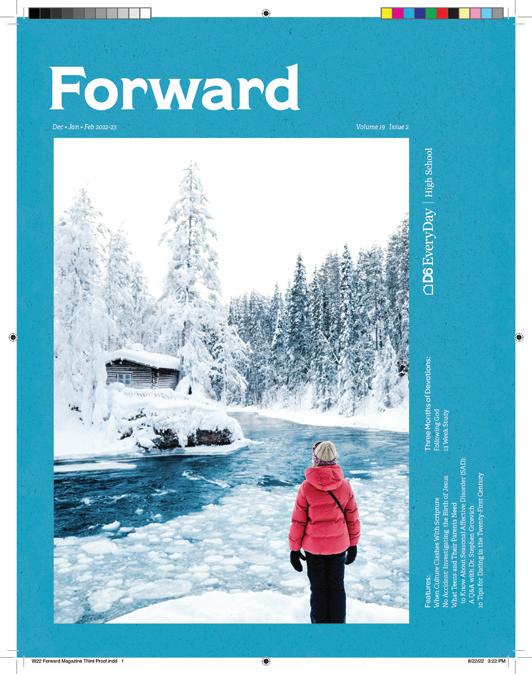
Feb. 12 Called to Serve (2 Timothy 2:1-26)
Feb. 19 Continue in Truth (2 Timothy 3:1-17)
Feb. 26 God’s Word Stands (1 Peter 1:25; Matthew 5:18; 24:35; Malachi 3:6; Ezekiel 24:14)
“For this cause also thank we God without ceasing, because, when ye received the word of God which ye heard of us, ye received it not as the word of men, but as it is in truth, the word of God, which effectually worketh also in you that believe.”
—1 THESSALONIANS 2:13
“Come Thou Fount” by Robert Robinson has become one of the most familiar, enduring, and well-loved hymns. However, before Robinson became a Christian, he wasn’t open to the Bible. In fact, he and some young buddies once went to hear the famous evangelist George White field—not to listen but to mock the preacher and his followers.
However, a phrase from Whitefield’s sermon hit home with Robinson: “the wrath to come.” Robinson didn’t be come a Christian that day, but for months, even years, he couldn’t shake those words. He became a Christian much later, but it all began with that simple phrase impacting his heart and conscience.
The story illustrates the power and effectiveness of the Word of God. The Bible describes itself as living and ac tive, sharper than a sword, piercing deep within to discern the thoughts and intentions of the heart. God is always at work in the world through the simple, yet life-transform ing power of His Word. If you want God to work in your life, understand both salvation and sanctification come through His Word.
Salvation comes through accepting God’s Word.
First Thessalonians 2:13 makes a powerful statement about the nature of the Word of God. Specifically, Paul re ferred to the gospel message, even though he did not use the term. He referenced the time the pagan Thessalonians heard the gospel message from him and accepted it.
I find it interesting Paul had a different strategy when interacting with Jews. He reasoned with them from the Scriptures, the Old Testament, which the Jews accepted as the Word of God. Paul used Old Testament Scriptures to demonstrate Jesus was the Christ, the promised Messi ah of the Old Testament.
But the Thessalonians didn’t have an Old Testament back ground. Paul understood and claimed the gospel message about Jesus Christ came from God. The gospel originates with God. Yes, He uses men to spread it. He uses people to proclaim it. Ultimately, though, it comes from Him. Our “faith comes by hearing and hearing by the Word of God.”
The Bible is a human book. It didn’t float down from Heaven. God used men to write it, writing over many centuries to different audiences, with different purposes, and through unique writing styles and literary genres. The Bible came through human language. However, if we stop there, we miss a crucial point the Bible repeats constantly about itself. The Bible is the Word of God. How do we know the Bible is God’s Word? Consider its in ternal consistency, fulfilled prophecy, the 40-plus authors spread over centuries who produced a single unifying theme without collaboration. Look to Jesus, who fulfilled the Old Testament covenants and prophecies in “real time.” Listen to the voice of the Holy Spirit, who authored the book and bears constant witness to His words. He takes the Word of God and brings it home to the individu al person; He alone can make it personal.
Two Greek words (both translated received ) are used here to stress this initial hearing and acceptance of God’s Word. The first was commonly used to describe the acceptance of a tradition, the same idea found in 1 Corin thians 15:3-4, where Paul described his own acceptance of the gospel message: “For I delivered unto you first of all that which I also received, how that Christ died for our sins according to the scriptures; And that he was buried, and that he rose again the third day according to the scrip tures.” The second word translated received is still about acceptance, but it additionally carries the idea of welcom ing something, and was sometimes used in hospitality.
If you want God to work in your life, understand both salvation and sanctification come through His Word.
is sanctification: the process by which God conforms us, shapes us to think, feel, and act more like Jesus. This on going process will never be completed in this life. But this verse encourages readers: God is faithful to work through His Word to change and mature us.
When the Word of God comes to us, we choose to receive it and welcome it, or we choose to reject it. Do you want God to change your life? Welcome the Word. Give it free rein in your heart and mind. The Word is powerful and effective, comforting, convicting, encouraging, exhorting, correcting, and training, It will continue working in every area that needs improvement as long as we accept it, welcome it, and believe it.
The Word of God is the compass for the Christian. No matter where you find yourself in life, or in what situation, the Word is your true north, providing God’s direction. It is the only sure and steadfast foundation upon which you can build your life. As the songwriter reminds us from the Sermon on the Mount, “All other ground is sinking sand.”
Think about it like this—Your home is your space, and your front door marks the entrance into your space. You may refuse access to some people who ring the doorbell, or even pretend you aren’t home. They aren’t welcome at all. Then there is the pizza guy. He is welcome (especially if you have teenagers like I do) but likely not welcomed all the way in. But when family, friends, or grandkids show up, you welcome them and encourage them to make them selves right at home.
When the Thessalonians heard about Christ, they wel comed the gospel message into their lives and were radi cally changed. They invited Jesus into their lives to “make Himself at home.” That made all the difference. They found salvation from accepting the Word of God.

Transformation comes from believing God’s Word.
Not only did acceptance of God’s Word bring salvation, but Paul also stressed God continues working through His Word to change lives. Paul wrote in present tense as demonstrated by the words “effectually worketh” and “believe.” After we are saved, God continues to work in us through our ongoing belief in His Word. I can’t speak for you, but much remains to be done in my life. As the familiar children’s song says: “He’s still workin’ on me, to make me what I ought to be.”
The big word theologians use to describe this process
The Word of God is your food, strength, and sustenance. Jesus fought temptation by reminding Satan man doesn’t exist on bread alone (physical food) but feeds upon the Word of God (Matthew 4:4). The psalmist likens God’s Word to a lamp for our feet and a light for our path (Psalm 119:105).
I once heard a lady share her salvation testimony. She described a season of doubt. Although she had prayed to become a Christian, she felt uncertain, struggling with assurance. She shared how she gained assurance from a somewhat surprising section of the Bible. While reading the opening chapters of Genesis and the creation account, she encountered the phrase, “And God said...”
Those words settled it for her. She already believed the gospel—but something about that simple phrase provided the assurance she needed desperately. God said it. She accepted the gospel and welcomed it into her life. As a result, His Word provided the reassurance she needed, “effectually working” through her belief. May the same be true for all of us.
About the Columnist: Dr. Barry Raper is associate dean of Welch Divinity School and pastor of Bethel Free Will Baptist Church near Ashland City, Tennessee.
Do you find yourself frustrated and exhausted by political discourse—even among Christians?1 Are you concerned that some regard themselves first as Democrats, Repub licans, or Independents, and second as Christians? Few things create strife like conversations about faith and politics. For that reason, many learned as children not to discuss politics or religion in polite company. That advice is helpful only to a point. Cultivating a Christian world view requires we think biblically about all of life, includ ing politics (and not just around election time). With that in mind, consider four practical principles for political discourse.
Regarding faith and politics, we usually encounter two types of people. The first advocates for one party over others: no party is perfect, but one party aligns itself more closely with truth. At the very least, they hold, one party is less hostile to Kingdom values or less harmful to Kingdom witness than others. Politics is an inevitable part of life.
1 This article is an adaptation of an article that appeared first in The Brink Magazine. See Matthew Steven Bracey, “Thinking Biblically About Political Discord,” The Brink Magazine (Winter 2018–19): 2–16.
The second exhibits suspicion toward Christians tied too closely to political parties, whether left, right, or middle: culture wars are not won at the voting booth but in the church pew and pulpit. Party politics often revolve around special interests, they explain, and political discourse contributes to discord. In contrast, God’s Kingdom is the multicultural, multiethnic, multinational Body of Christ.
In many instances, this divide manifests itself among the generations. Baby Boomers (born 1946–64) often dis play enthusiasm for one political party over another. In contrast, Millennials (born 1981–96) frequently express misgivings about previous generations’ approach to faith and politics. Generation X (born 1961–81) sometimes splits the middle of these two approaches. My experience in higher education suggests the jury is still out on Gen eration Z (born 1995–2010). Even if specific groups defy broad generational characterization, this basic narrative still describes a commonly observed phenomenon. Amid this scuffle, what is a proper stance toward politics?
God is the sovereign King of the cosmos. Nothing in the heavens or on the earth escapes His care, including affairs
of state. In fact, God works in them, through them, or de spite them. But He does not ignore them. Neither should we. The political sphere is bustling with divine activity, and believers should engage it, even though it is fraught with complications and disappointments.
Biblical figures offer a helpful example. Again and again, God fulfilled His purposes through His children’s interactions with the nations, as evident in Egypt, Babylon, Persia, and Rome. Political and religious leaders alike fol lowed God’s leading in this area, whether Joseph, Moses, Daniel, Esther, Ezra, or Paul. The rulers with whom they interacted were wicked people, yet God’s children did not evade God’s call to contend with them.
In Matthew 22, Jesus said to render to Caesar what is Caesar’s and to God what is God’s. The political sphere plays an important role in the work of God. Present in Jesus’ statement is a disposition of respect and reverence. In Romans 13, Paul explained God ordains a state ruler as His minister to encourage good and discourage bad. When a government does not fulfill these ends, it fails in its prescribed purpose.
Consider the United States as an example: it performs many rightful actions we take for granted, such as incen tivizing religious and charitable activities with nonprofit benefits and deterring criminal activity with penalties. On the other hand, it also acts beyond its proper function when it celebrates sexual sin and punishes actions and even rhetoric to the contrary.
Significantly, Jesus and Paul each engaged in political discourse and set forth principles while being fully aware of the evil practices of the Roman Empire. Thus, corruption in politics is not a license to disregard respon sible engagement. In a fallen world where God’s common grace abides, governments will contain both good and bad elements. Jesus calls believers to be separate from the world while also calling them to go into the world. He sends us as salt and light to a decaying world and a dark culture. Because Christ’s redemption of a fallen world is truly cosmic, He sends us into the spheres of culture, politics included. As a result, what ought Christian engagement in political discourse look like?
1. We should not retreat. We must not withdraw from the conversation. We cannot forsake politics because we cannot forsake culture. Although political discourse may (and does) try us, it should never cause us to retreat because our witness makes a difference.
Christians may rightfully feel discouragement at the current state of political discourse. The horizon may be lined with dark clouds. Even so, Christians cannot run for shelter from the raging storm. If ever the dark world needed the light of Christian witness, it is amid the storm. Withdrawal would have dire consequences.
The prophetic witness of the Christian, even if difficult, is important. We must not remove our Kingdom witness from the public square. Rather, we should take our values into the public square. We must stand—full of grace and truth—for a godly vision of things like life, marriage, and religious liberty. Depending on the issues, this stance will mean we champion or oppose one political party over another, not because of political policies per se, but because the Bible enjoins believers to stand for truth in every area of life.
Thinking biblically and thinking politically are not mutually exclusive dispositions. At issue is not whether we should think in terms of politics, just as the issue is not whether we should think in terms of the arts, education, or the family. At issue is how we think of these spheres: whether the Bible informs our worldview on these issues.
2. We should repent of our respective sins: idolatry, apathy, pride. Unfortunately, some people put political convictions above their Christian ones. Lest we think these are new challenges, Reinhold Niebuhr wrote in the 1950s: “The tendency to equate our political with our Christian convictions causes politics to generate idolatry.”2 Such persons should repent of their idolatry. The Bible stands above politics, not politics above the Bible.
Other understandings of the Christian life practically exclude political discourse altogether. Niebuhr also criti cized those who “find no relevance at all between our faith
2 Reinhold Niebuhr, “Christian Faith and Political Controversy,” Christianity and Crisis, July 21, 1952, in Reinhold Niebuhr, Love and Justice: Selections from the Shorter Writings of Reinhold Niebuhr, ed. D. B. Robertson, Library of Theological Ethics (Louisville: Westminster/John Knox, 1957), 59.
and our political actions. This answer is wrong because it denies the seriousness of our political decisions and obscures our Christian responsibilities for the good order and justice of our civil community.”3
If the first group should repent of its idolatry, this second group should repent of apathy. The Christian worldview is for all of life. Following Christ involves taking every thought captive. The state fosters order and justice. Thus, in pointing a way forward, we should not let the proverbial pendulum swing to either extreme.
Still others legitimately think in terms of the Bible first and politics second, but we interpret them vice versa. In that case, their manner of discourse usually contains some quality, such as an unbending dogmatism or pompous self-righteousness that is antithetical to a gospel of grace. Such persons, who exist on both sides of the political aisle, should repent of their pride.
When political values conflict with biblical values, we must follow Scripture. However, when political values concur with biblical values, we may confidently promote and defend those political positions. Such cases are not evidence of politics first and the Bible second. They are recognition and celebration of the fact that state leaders are fulfilling their rightful Romans 13 function.
3. We should grant grace to one another when we disagree. Sometimes, the difficulty is not that we are thinking first in terms of politics and second in terms of Christianity but only that we interpret one another as do ing so. Legitimate differences of opinion may not amount to political idolatry but are simply differences in how we interpret and/or apply the biblical text. Notwithstanding these complicated contingencies, we should not forsake the complex work of political discourse and engagement.
In these instances, we should extend grace to those with whom we disagree rather than heaping judgment on them. Still, we should seek to persuade one another of what we believe is right. Whatever our personal leanings, we tend to view likeminded people as kind and reasonable and the contrary-minded as obnoxious and pigheaded. We should avoid that mistake. Every group contains those who are courteous and others who are rude. We should learn from the best of one another in the grace and humility of Christ.
4. We should engage in political discourse in a manner consistent with the Spirit of Christ. Those tempted to place too much hope in party politics should remember God’s Kingdom is separate from man’s kingdom. Those tempted to place too little concern in party politics should remember that God’s Kingdom is not mutually exclusive to man’s kingdom. We should not respond to others’ unbridled fervor or obnoxious sanctimony with apathy. Instead, we should give leadership to a difficult area; otherwise, someone else will (and not for the better). Like Jesus and Paul, we should steward the call honorably and respectfully.
No political party or leader is entirely good or bad, correct or incorrect. Instead, they are a mixture. At the same time, some will align their positions more closely to biblical truth. When they do, we should not feel guilty for supporting them, and when they do not, we should not feel guilty for criticizing them. However, we should be “equal opportunity offenders.” For example, some people draw attention to Democrats when they do good but not to Republicans, just as they will draw attention to Republicans when they do bad but not to Democrats. Such is evidence of thinking politically rather than biblically.
The sovereign God works amid political realities for the causes of freedom, justice, and truth. Ultimately, neither our actions nor our inactions occur in a vacuum but instead contribute to political reality, whether we like it or not. In a democratic republic, such as the United States, citizens contribute to the rule of the state through their involvement. God ordains you and me to give righteous leadership to this area.
Likely, most of us will never run for political office. But we must know and discuss the issues, always in a manner that displays the fruit of the Spirit and working toward the common good in the public-political square.
About the Author: Matthew Bracey (M.T.S., J.D.) works at Welch College, where he serves as vice provost for academic adminis tration and a faculty member, teaching courses in history, law, and theology. He is a co-founder and senior editor of the Helwys Society Forum (thehsf.com).















I have had plenty of reasons to walk away from the faith, or really, never to have begun it. If you will excuse a personal account, I grew up in a household that did not put an emphasis on Christianity and the truth of Scripture. My family went to church occasionally, but whatever commitment to the faith we displayed by attending church on Sunday was often neglected the following Monday.
So, when I heard the gospel and confessed Christ as a teenager, I found myself working against the grain of not only my family but also my friends. Many around me found Christianity too exclusive, too old, too supernatu ral, or too boring. Yet I found it embracing, relevant, pow erful, and compelling. Though I knew Christianity to be these things, I did not always have the words to articulate my newly-found, vibrant, and growing faith.
As I grew in my faith, I heard stories of people having the exact opposite experience I did. As I found more reasons to believe and dive deeper, I started to hear declarations of those who had “deconstructed” their faith. Stories of deconstruction seem to be everywhere these days. Popu lar YouTubers Rhett and Link, author and former pastor Joshua Harris, speaker and blogger Jen Hatmaker—the list goes on.
With each passing year, more well-known (and not so well-known) Christians are forsaking the faith they once held dear. Some who have deconstructed still claim the title “Christian” in some sense, but more often they be come agnostics, not knowing what to believe. The list of “exvangelicals” has become long, and the troubling trend is unlikely to slow anytime soon.
Anytime we enter the fray, we must define our words clearly. The word deconstruction , like other popular buzzwords, has the perplexing ability to mean just about anything. The semantic domain seems to be a Rorschach test, saying more about its user than an objective idea. In philosophy courses, one idea generally reigns supreme: you must clarify your terms. It is fine to discuss ideas, terms,
etc., but one must be clear on what he or she means when using a term. To be sure, those who use the term decon struction would benefit from such an admonition.
In my own engagement with this term, I have generally found three usages: 1) a form of Derridian deconstruction; 2) a push to release Christianity from kinds of cultural baggage; and 3) a move toward affirming doubts regarding orthodox Christianity. We will deal with each of these individually.
First is the “deconstruction” of Jacques Derrida, a post-structuralist and postmodern philosopher. Derrida was probably most well-known for his process of engaging with texts and meaning he referred to as “deconstruction.” Derrida resourced Martin Heidegger. Though oversimpli fied, Heidegger (like George F. Hegel before him) sought to synthesize two opposing ideas (thesis and antithesis) into a new concept (the synthesis). Unlike Heidegger, Der rida was not looking for a dialectical approach that would result in some sort of synthesis. Derrida was not really interested in method or analysis or critique. Instead, his philosophy was more an axe laid to the root of ideas.
Derrida rejected Plato’s concepts of true forms and essenc es—those concepts that transcend time and space, and the fundamental definitions of what things are. Derrida be lieved we should engage with meaning, but not construct it. Instead, he admonished readers to challenge, confront, and ultimately—no surprise— deconstruct the meaning. As you can see, this approach is ultimately subversive. While some people in evangelicalism and the broader Christian context may have this background in mind regarding deconstruction, I do not consider it the most common use of the term.
Second, some argue for deconstruction to release Christi anity from perceived “cultural baggage.” Broadly speak ing, these people seek to clarify the essence of Christianity and remove unfortunate cultural attachments. A subscrib er to this view would argue a particular “form” of Christi anity has become too captivated by its parent culture and needs to be deconstructed to reveal what is and what is not part of faithfully expressed Christianity.
Third, others use the term deconstruction to describe genuine rejection of orthodox Christianity. Those who employ this term would say “X” doctrine consistent with the historic Christian position is not a position with which they agree. Therefore, they reject either that doctrine or the entirety of Christianity. Probably most prominent in these discussions are the topics of gender and sexuality. In a culture where the emphasis is placed on personal autonomy and happiness, the historic Christian positions on gender and sexuality have caused many to reject these positions outright.
These three uses are not always exclusive, especially when individuals do not clarify how they are using their terms. Instead, the lines can easily blur between categories, and it can be incredibly difficult to untangle. For example, those seeking to reject or remove parts of orthodox Christianity may also be responding with an intentionally subversive Derrida hermeneutic. Or those seeking to remove cultural add-ons may inadvertently challenge historic Christian positions. The confusion between these categories seems to be at the heart of all the unconstructive debate about deconstruction. Thus, we have more reason for Christians to be clear and truthful in these conversations.
Now that we have examined these three uses, we may ask how we engage with the topic of deconstructionism overall and with those engaging in a process of deconstruction. Of course, this question is monumental, one that probably needs a book rather than a brief article. That said, I offer some profitable steps forward.
As Christians, we are admonished to do all things in love. Moreover, we are to speak the truth in love (Ephe sians 4:15). Too often we speak the truth with harsh tones and judgmental declarations. But this is not the way of Christ. Or, conversely, we accommodate the zeitgeist by simply privatizing our faith and failing to express it right
ly as true King dom followers.
This is not the way of Christ, either.
Instead, we must hold to orthodoxy and orthopraxy with a zeal for the truth and a heart full of compassion. The biblical commitment to both right teaching and right living should shape our con versations on any topic and certainly orient our hearts and minds as we meet with individuals.
The first question I ask someone is what they mean by deconstruc tion. This helps me know where to start a conversation. “What kind of deconstruction am I engaging with?”
The rest of this article pertains to the latter two definitions of deconstruction. First, some in the Unit ed States are concerned about the cultural captivity of Christianity across the theological spectrum. Individuals are worried that much of Christianity has become too consumeristic, too anti-intellectual, too sentimental, too ethno-centric, too narrow, too repressive, etc. Each of these critiques would need to be considered on its own merit, but Christianity clearly can become too culturally captive. It has happened plenty of times before and cer tainly will happen again.
We must remember Christianity is not expressed in a vacuum. Certainly, the fundamentals of Christianity are true across all time and space. Yet, we express our faith in a particular time and place. That is why—at least at my local church—we pray, sing, read, testify, and hear the sermon preached in English. Even more, our pastor seeks to apply the sermon specifically to the lives of our congre gants. Thus, while we should seek to challenge cultural accommodation, we also need to realize that any given Christian lives within a cultural context. The pursuit of true Christianity is a rightful one. The pursuit of Christi anity absent of a culture is impossible.

What about those who seek not to find genuine Christi anity but to reject all or parts of? We must be abundantly clear on what constitutes true Christianity. The problem is we can be notoriously bad at determining the importance of a doctrine. For this reason, Christians should seek to employ basic theological triage. We must be clear about the distinction between the “fundamentals” of the faith and secondary and tertiary issues. For example, those who reject the divinity of Christ clearly have abandoned the es sence of Christianity. However, if they challenge theories on eschatology, they have more freedom.
Undoubtedly, these examples are rather easy. For this reason, we should recognize the Church broadly has held strong doctrinal positions on culturally tenuous positions relating to sexuality, gender, and more. If an individual stands at odds with two millennium of Christian belief, he or she is most likely not on the side of truth. We might also consult the creeds and confessions of the early church to understand whether we (and deconstructionists) stand in solidarity with the historic beliefs of Christianity.
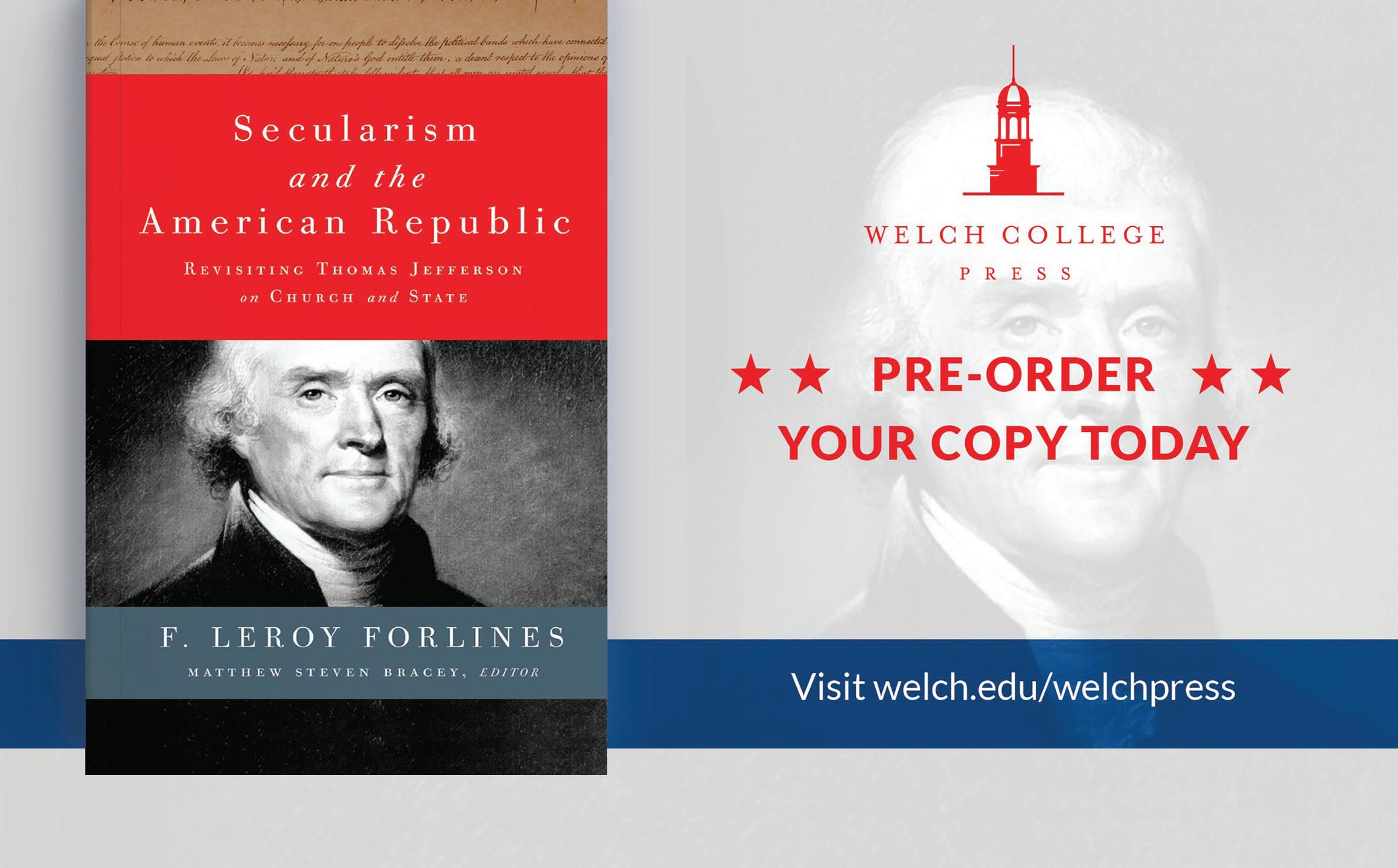
Generally, I do not find the term deconstruction to be

useful. If someone is engaging in theological reflection that rejects cultural accommodation or orthodox theolog ical doctrines, deconstruction does not seem to be a helpful term. It is so easily confused with the Derridean term, and one can quickly assume those individuals are engaging in a seditious philosophical approach that leads to and em braces a postmodern worldview. Yes, they very well might be, but not always.
I encourage individuals to be clear, to be helpful and truthful in labeling their thought for what it is. Are you rejecting biblical Christianity? Call it what it is. Are you wanting to clarify the heart of biblical Christianity amid its cultural expression? Pursue clarity.
But remember, as Christians, we pursue clarity and charity—not apart from one another but in tandem.
About the Author: Chris Talbot, a native of Tecumseh, Michigan, now resides in Gallatin, Tennessee, with his wife Rebekah and their three sons, William, James Elliot, and Samuel. He serves as youth and family ministry program coordinator and campus pastor at Welch College. This article has been adapted by permission from the Helwys Society Forum: TheHSF.com.
The inaugural class of the Master of Arts (M.A.) degree in Humanities recently began studies at Welch College, according to Welch Provost Dr. Matthew McAffee. The 33-semester-hour graduate degree is designed to prepare college graduates who desire additional education in the humanities. It is especially suitable for those seeking a Ph.D. in one of the humanities fields (e.g., English, histo ry, philosophy, politics, the arts, law, and theology) or to obtain a credential as a community college teacher in the humanities.
Coursework for the interdisciplinary degree will integrate the classical disciplines of the humanities: arts, culture, hermeneutics, history, law, literature, philosophy, and the ology. Graduates of the program should be able to demon strate the following objectives:
• A sound grasp of the philosophical issues undergirding the disciplines of the humanities
• Knowledge of the major writings in literature of the great tradition, including a knowledge of the underly ing issues present in the interpretation of works more generally
• Critical analysis of culture and its artifacts
• Competency in original research
“We’re excited about this new degree program,” McAffee said. “We have a lineup of exceptionally qualified faculty members who will help prepare students for Ph.D. work and teaching in the humanities fields. This kind of prepa ration is important in our day. The university departments in the humanities are most influential in shaping the ideas that drive our culture. We desire to help produce bright, young Christian thinkers who can affect their culture with a Christian worldview, and this program is carefully designed to do just that.”
McAffee continued, “The program is also great for community college teachers and students interested in the humanities but unsure regarding what career they want to pursue. What’s more, it’s very affordable. We encour age students who might be interested in the program to
contact program coordinator Matt Bracey at mbracey@ welch.edu.”
The two primary faculty members for the degree will be Matthew Steven Bracey, who will also serve as coordina tor for the degree program, and Tyler Flatt. Other faculty from the humanities areas at Welch will also teach in the program.
Matthew Steven Bracey, a native of Ashland City, Tennessee, has taught at Welch for nine years and serves as vice provost for academic administration and assistant professor of theology and culture. A graduate of Welch College, he holds the M.T.S. degree from Beeson Divinity School and the Juris Doctor degree from Cumberland School of Law of Samford University. He is currently completing a Ph.D. in Chris tian ethics and public policy with a minor in philosophy at Southern Baptist Theological Seminary, writing his dissertation on the moral imagination in the thought of Edmund Burke. He is founding co-editor of the Helwys Society Forum (TheHSF.com) and is a prolific writer and editor, having co-edited and contributed to two books, Sexuality, Gender, and the Church (Welch College Press) and The Promise of Arminian Theology: Essays in Honor of F. Leroy Forlines (Randall House Academic). Bracey has written for numerous publications, including ONE Magazine, the Journal of Biblical Higher Education, Christian Academia, and the Evangelical Quarterly. He also serves as managing editor of Welch College Press. In his spare time, he enjoys gardening and coaching Welch’s men’s and women’s cross-country teams. He is married to Sarah, who heads the psychology program at Welch.
Matthew Steven BraceyDr. Tyler Flatt will serve as adjunct instructor for the new program, teaching summer courses in great texts of the western tradition. He serves full-time as assistant professor of humanities and co-director of the Augustine Honors Collegium at Boyce College of Southern Baptist Theolog ical Seminary. Born and raised in Ontario, Canada, Flatt

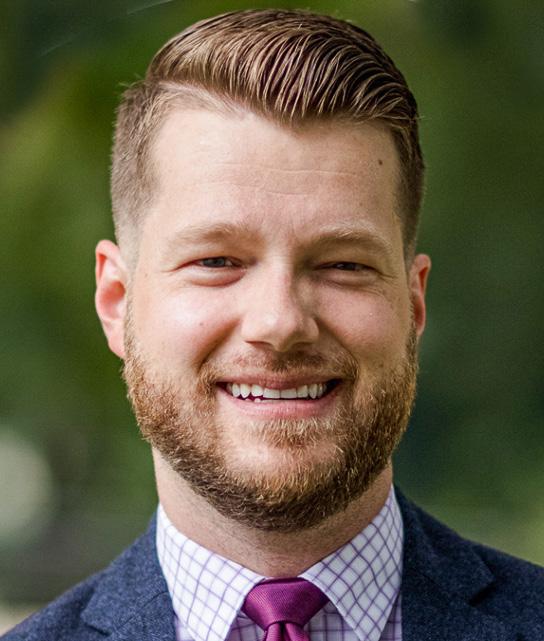
holds a Ph.D. in Classics from Harvard University, having earned a B.A. from the University of Waterloo and the M.A. from University of Toronto. Flatt is dedicated to the conservation and ongoing interpreta tion of the western intellectual and cultur al tradition and enthusiastically supports the current revival of interest in classical education in North America. Flatt’s work has appeared in The Classical Journal, Classical World, The Classical Review, The
Journal of English and Germanic Philology, and Vigiliae Christianae. Current projects include an edition and trans lation of Erasmus’s Annotations on the Gospel of John for the
Collected Works of Erasmus (University of Toronto Press). He also hosts Daily Dose of Latin, a video series devoted to short explanations of passages from the Vulgate, the Latin Bible of medieval Europe. He is married to his best friend Liz, and when he is not reading or writing, he likes to fish. The first course, Great Books: Ancient and Medieval, was taught this summer by Dr. Flatt, consisting of online instruction beginning in early July and a week-long, on-campus intensive the first week of August.
For more information on the M.A. in Humanities at Welch, email program coordinator Matthew Bracey at mbracey@welch.edu. For general information on Welch, visit www.welch.edu.
Todd Parrish assumed a new role as vice president for institutional advancement July 1, following the retirement of David Williford, according to Welch President Matt Pinson.
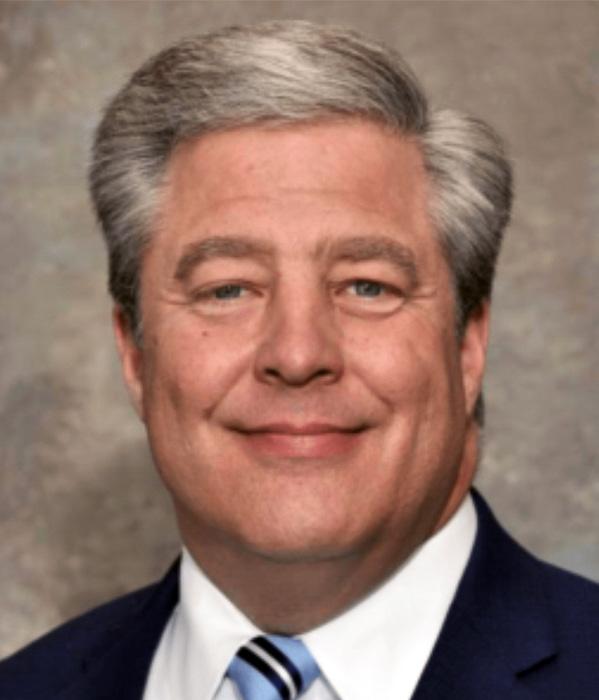 Todd Parrish
Todd Parrish
Parrish came to Welch in January 2018 as director of church relations and major gifts officer before transitioning to the role of associate vice president for institution al advancement. In his new role, he will engage in the overall administration of fundraising and external relations at Welch, working with Tim Owen, director of the Welch Fund. Williford will continue in a part-time fundraising role.
“Todd Parrish is tailor-made for this position,” Pinson not ed. “No one loves Welch more than Todd. He combines a deep knowledge of our alumni base and denomination with a singular penchant for ‘friend raising’ and has distinguished himself as an excellent fundraiser in his five years at Welch. He’s known for his hard work and can-do attitude. I’m so glad to have him in this new role.” Before coming to Welch in 2018, Parrish served as senior
pastor of First FWB Church, Washington, North Caroli na. A North Carolina native who ministered in churches in North and South Carolina for 26 years, Parrish has served in a number of denominational roles, including director of the South Carolina FWB Children’s Home, assistant moderator of the North Carolina State Associ ation, and vice president of the Welch College Alumni Association (current).
Parrish was ordained under the ministry of Dr. Malcolm C. Fry. A 1989 Welch graduate in Bible and church music, he engaged in graduate study in music at Middle Ten nessee State University and obtained the M.A. in mental health counseling from Webster University in 2010 and the M.A. in theology and ministry from Welch in 2018. He is nearing the completion of a doctorate in educational ministry at New Orleans Baptist Theological Seminary and is writing his doctoral thesis on the advancement and fundraising function of Welch College. Parrish and his wife Merinda, Welch’s clinical coordinator for teacher education, have two married daughters, Emily Vickery (Zach) and Ellen Stox (Kevin), both Welch gradu ates, and two grandchildren, Lucy and Jack.
Many years ago, I read a “biography” on President George Herbert Walker Bush (Bush 41, the elder). This unique vol ume is entitled All the Best: George Bush, My Life in Letters and Other Writings. The author collected copies of letters, diary entries, and other writings by George from 1941 until 2010 and arranged them chronologically to tell his story.
Letters provided insight into Bush’s college days and naval service, including World War II (some very touching letters). The book contained correspondence from his presidency and the oval office decisions over which he anguished. The author allowed readers to glimpse real insights of this leader. He titled the book All the Best to reflect the way Bush closed nearly every letter.
Writings reveal much about the way a person thought, felt, interacted, viewed himself or herself, and his or her worldview. Just like George Bush’s biography, we gain insight into David from the book of Psalms. (Not every Psalm was written by David, but half were.)
In his writings, David wove the story of his ups and downs through celebrations, raw emotion, and even depression. Like any leader, David’s life experiences found their way into the fabric of each prayer, song, or expression he penned in the Psalms. The warrior-shepherd offered up words the Brooklyn Tabernacle Choir later sang: “Thou O Lord are a shield for me, my glory, and a lifter of my head.” Welch Choir, under Vernon Whaley’s direction sang another of his psalms: “O LORD, our Lord, how excellent is thy name in all the earth!” Do you think perhaps David was thinking of facing Goliath and his many other battle field experiences when he wrote: “The Lord is my rock, and my fortress, and my deliverer; my God, my strength, in whom I will trust.”
Like most leaders, David faced times where deliverance was not assured, creating anxiety and even depression. We see anxious moments like these in Psalm 27 or in the horrible, dark pit that swallowed David in Psalm 40. David did not play the tough guy in his writings, but instead dis played vulnerability when he wrote about his deep grief in Psalm 69 and confessed heartbrokenness over his sin
with Bathsheba in Psalm 51.
Regardless of his emotions, colorfully depicted by his own writings, this great leader of the Old Testament knew to follow principles. “The steps of a good man are ordered by the Lord: and he delighteth in his way” (Psalm 37:23). He wrote words to comfort us when walking through the valley of the shadow of death (Psalm 23) and reminded us how God reveals the path of life, because in God’s presence is fulness of joy.
Certainly, none of us will write psalms to be added to the canon of Scripture; and few of us will publish an autobiography. However, praying and sharing with close friends can help us through the horrible pits. May these words penned by the leader David (see list at right) encour age you as you experience the ups and downs of life and leadership.
About the Columnist: Ron Hunter Jr. has a Ph.D. in leadership and is CEO of Randall House & D6 Family Ministry. You may contact him at ron.hunter@randallhouse.com.
Psalm 3:3 & 8:1
Psalm 18:2
Psalm 40:1-3
Psalm 51:4, 10
Psalm 69
Psalm 37:23
Psalm 27
Psalm 23 & 24:1
Psalm 16:11
“Only if you have been in the deepest valley, can you ever know how magnificent it is to be on the highest mountain.”
—Richard M. NixonRecently, while standing outside our church before the an nual meeting of Kansas Free Will Baptists, Wesley, a new attendee at our church, asked, “How does this Free Will Baptist state association stuff work, anyway?”
I quickly ran the mental gambit of our fellowship of churches and administrations, and, wanting a simple answer, replied something close to this: “Free Will Baptists believe in the autonomy and authority of the local church. These churches voluntarily come together and associate with one another, so we can accomplish greater things for the Lord, on a much larger scale, than we could ever do as a single church. It also gives us the opportunity to encourage and help one another as we co-labor in the Kingdom, working beside one another.”
When I stepped into the business meeting later that morning, I looked around and saw others who loved Jesus just like me.
Wesley smiled and nodded approv ingly, seemingly content with this brief answer to his question. His question came at a great time for me. Kansas was about to adopt a new constitution and a repentance declaration. We also were tasked with choosing a new state treasurer and clerk. The nominees were to replace the current leaders who had led for decades but were now retiring. Big shoes to fill!
I was a little nervous about the business meeting where we would complete these important tasks. I couldn’t help but wonder if there would be contention over documents or nominations, or even the roles they would fill.
Yet, answering Wesley’s question reminded me of our real purpose of the upcoming meeting. I love my Free Will Baptist brothers and sisters. It is an honor and privilege to labor together to bring glory and honor to Jesus. When I stepped into the business meeting later that morning,

I looked around and saw others who loved Jesus just like me. They wanted God to move in Kansas just like I do. I began to relax, reminded by a simple question that God is in control of the Free Will Baptist work in Kansas, and He will continue to lead us in powerful, unified ways.
It would help us all to remember this: our sister churches, districts and quarterlies, state associations, and national departments are not our competitors or our enemies. They are our comrades-in-arms, our peers, the ones who have our backs when the true enemy of the soul attacks.
I love Jesus, and I love Free Will Baptists, too. Let’s work together for the Kingdom. We have much work to do, and we will do it better together.
About the Author: Jerrod Vickers is pastor of spiritual develop ment/youth at Cross Point Free Will Baptist Church in Wichita, Kansas: crosspointfwbc.com.

“What can Free Will Baptists do through tech nology to reach people with the gospel?” This was the question delegates to the 46th annual session in Ft. Worth, Texas, set out to answer when they appointed five men to a committee to uncover the possibilities of sharing the gospel through radio and television.
After a year of research and study, those com mittee members: Sandy Goodfellow, Guy Ow ens, Larry Hampton, George Lee, and Raymond Riggs felt it would be in the denomination’s best interest to begin the Radio and Television Com mission, and their recommendation was adopted at the 1983 convention in Columbus, Ohio.
In 1984, in Little Rock, Arkansas, the committee unveiled a 15-minute radio broadcast: Victorious Faith. The distinct ly Free Will Baptist radio program had the primary focus of preaching the Word of God with power to reach souls for Christ and to promote the work of the denomination.
Radio host Jim Vallance opened each broadcast with a musical selection featuring a Free Will Baptist musician followed by preaching from Dr. Tom Malone and Rev. Bob Shockey. Doug Little played the theme song “Faith Is the Victory.”
By 1987, Victorious Faith was being aired on six stations, including the 50,000-watt broadcast from KAAY in Little Rock, Arkansas. This station was aired in 27 states and 13 countries. Broadcasts could be heard each Sunday at 8:00 p.m. on station 1090 on the AM dial. The broadcast continued through 1997.
In 1997, the Radio and Television Commission was renamed Free Will Baptist Media Commission. The group refocused efforts through partnerships with state associa tions in Florida and Tennessee, pursuing opportunities to produce radio commercials, videos, and printed material. A television commercial entitled “The Arrow” encour aged church members to talk to their communities about strong family values and invite them to a Free Will Baptist church in their area.
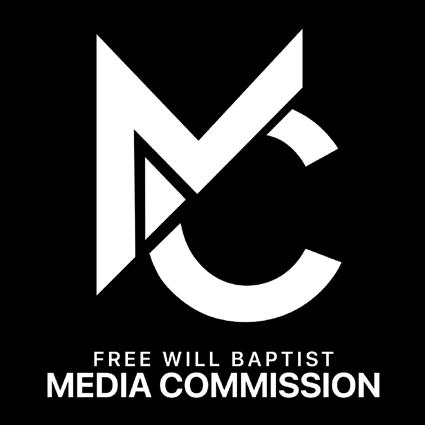
In the early 2000s the commission worked in cooperation with Mike Anderson to record nightly convention services and produce CDs and DVDs to be purchased for a small fee. In 2010, under the leadership of Keith Fletcher and Travis Penn, the commission began streaming convention services, adding thousands of additional viewers. Over the past 12 years, the commission has continued to improve and refine streaming, and today, convention services reach hundreds of thousands of people around the world.
Communication technology is ever-changing and plays an influential role in society. As a commission, our desire is to build upon the past to merge these constant changes with the gospel. To do this, we must stay on the cutting edge of technology yet preserve, maintain, and strengthen Free Will Baptist distinctives and heritage.
The dream that began in 1982 continues today. I have a unique opportunity as the grandson of one of the origi nal members, Guy Owens, to see that mission and vision through as the Media Commission builds upon and advances the cause of Christ through media.
The commission is available to all churches and denomina tional agencies for assistance and resources. We are thank ful for the opportunity to serve our denomination.
About the Author: Josh Owens is a member of the Free Will Bap tist Media Commission: FWBMedia.com
Nashville, TN— Pastors and ministry leaders from across the denomination will gather at Sonesta Nashville Airport, December 5-6, for the 2022 Leadership Conference. The conference will offer two days of training, inspiration, and fellowship. Bestselling author and pastor Robby Gallaty will be the keynote speaker, exploring the theme “DiscipleShift.”
The pastor of Long Hollow Baptist Church in Henderson ville, Tennessee, Gallaty’s story is a vivid testimony to God’s grace. He was saved from drug addiction and today is driven by a passion to disciple others for Christ. Gallaty is found er of Replicate Ministries and the author of several books, including Growing Up, Firmly Planted, and Rediscovering Discipleship. He and his wife Kandi have two sons, Rig and Ryder.
Between keynote sessions, attendees will enjoy ban quet-styled meals, a broad variety of seminars, Q&A discus sions and workshops, and free time to fellowship or explore the sights in Nashville. Several denominational boards, commissions, and committees will meet in conjunction with the conference.
Visit nafwb.org/leadershipconference to register or for updates.
Marshall L. Bonéy III
Training Free Will Baptist Churches in Cross-Cultural Compe tence to Reach Their Multi-Ethnic Communities for Christ.
Fernando Bustamante
Discipulado
Matthew Bracey & Eric Thomsen
Going DPR: Developing Deliberate Personal Relationships for Discipleship
Carolyn Dwyer
The Pastor’s Wife: Our Ministry in Discipleship
Pedro Garcia
Discipleship When It Isn’t Wanted El Discipulado Cuando no se Quiere
Steve Greenwood
Priorities for Partnering With Parents
Ron Hunter
Five Strategic Questions for Effective Discipleship
Ruth McDonald
Be Sure to Like, Follow, and Share! (Becoming a Disciple who Makes Disciples)
Faron Thebeau & Josh Chapman
For Such a Time as This: Strategies for Discipling the Rising Generation to Reach a World We No Longer Recognize

Faron Thebeau
Para un Tiempo Como Este: Estrategias Para Discipular a la Generación Surgiente con el Fin de Evangelizar a un Mundo que no Receonocemos
Phyllis York
Discipling Across Generations
Monday, December 5
3:00 pm Registration
5:30 Supper
7:00 Evening Session* Speaker: Robby Gallaty
Tuesday, December 6
7:30 am Breakfast
9:00 Seminars 1
10:00 Seminars 2
10:50 Refreshments
11:10 Seminars 3
12:00 pm Lunch
1:30 Seminars 4
Free Time / Fellowship Opportunities
5:30 Dinner
7:00 Evening Session*
Speaker: Robby Gallaty
*Q&A Panels After Evening Sessions
Although we have all grown tired of Zoom meetings over the last two years, the pandemic taught us that technology presents an opportunity for people all over the world to come together and grow together in discipleship, encouragement, and accountability. The Executive Office is excited to announce new opportu nities for growth via Zoom.
We all gain knowledge from reading a good book. However, we harness even more of that knowledge when we read and discuss. Several opportunities for book discussions are coming soon.
• Dr. Jackson Watts, How People Change, September 15, October 20, November 10, and December 15 –4:00 p.m. CT
• Reuben Cason, Resilient Ministry, January 13, Feb ruary 10, March 10, April 14, and May 12 at 10:00 a.m. CT
• Dr. Matthew Pinson, 40 Questions About Arminian ism, February 17 at 3:00 p.m. CT
• Matt Mouser, Embers to a Flame, February 23, March 16, and April 7 at 2:00 p.m. CT
To participate, email questions@nafwb.org to learn the requirements and expectations for participating in the book discussions. Find updates on future book discus sions at: nafwb.org/growing.
We often learn much and find encouragement by get ting together and discussing the issues we all face in ministry. Recently, we launched groups for pastors and their wives, and more meetings are scheduled in the near future. To participate, email questions@nafwb.org to learn the requirements and expectations for partici pating in these discussions.
Churches who have used Know Your Community through the Executive Office are welcome to join on line discussions on reaching particular subcultures.
Mike Cash will consider Reaching Old and New Comers, October 11 at 10:00 a.m. CT.
Daryl Grimes will lead a discussion on Reaching the Traditional Living Subculture October 14 at 9:00 a.m. CT.
Faron Thebeau will consider Reaching College Towns, November 3 at 6:00 p.m. CT.
Jonathan Locklear will lead a discussion on Reaching Comfortable Empty Nesters, November 10 at 10:00 a.m. CT.
To register, email questions@nafwb.org.
From time to time, all of us benefit from having someone with whom we can talk confidentially. The Executive Office, in partnership with North American Ministries, offers the Refresh program for churches and pastors. A new resource from that program includes counseling from Tom Jones, church planter and professional coun selor with Keystone Christian Counseling. To learn more, call 877-767-7659 or email questions@nafwb.org.
Hopefully, we can all take advantage of these resourc es to grow together as we minister for the Lord.

fires, family emergencies
always best to be ready. The same is true for estates. Since 2013, FWB Foundation has partnered with

help thousands of Free Will Baptist
Estate Planning
for the future. Watch a brief video
how you can be prepared for your future.
Will Baptist
the Web
Will Baptist

